Free Biology Essay Examples & Writing Tips
Don’t know what to write about in your essay on biology? Looking for good biology essay examples for inspiration? This article has all you need!
A biology essay is a type of academic paper that focuses on a particular topic of biology. It can discuss animal life, cycles in biology, or a botanic subject. You will need to demonstrate your critical thinking skills and provide relevant evidence to support your perspective.
On this page, you will find examples of biology essays. You will also find here tips and topics prepared by our experts . They can assist you in nailing your short or extended essay.

Areas of Research for Biology Essays
If you’ve been assigned to write a biology essay, you probably know which area of research you have to choose. However, it might be beneficial to explore other available scopes. It’s useful for both interdisciplinary study and the cases when you are free to pick your area of research. In this section, let’s figure out what you can study in biology.
Here are biological areas of research you should be familiar with:
- Cancer Biology studies this type of disease to prevent, detect, diagnose and cure it. The ultimate goal of such biologists is to eliminate cancer.
- Cell Biology is a branch that studies the structure, function, and behavior of cells. Here, biologists study healthy and sick cells to produce vaccines, medication, etc.
- Biochemistry is an application of chemistry to the study of biological processes on cell and molecular levels. It is a cross-discipline between chemistry and biology. The focus is on the chemical processes of living organisms.
- Computation Biology is a study of biological data that develops algorithms and models to understand biological systems. Here, scientists either work for institutions or research for private enterprises.
- Genetics is an area that focuses on the study of genes and genetic variations for health benefits. It looks at the way DNA affects certain diseases.
- Human Disease is an area within which scientists study different diseases. The field covers cancer, developmental disorders, disease genes, etc.
- Immunology is a branch of biology that focuses on immunity. Immunologists look at the way the body responds to viruses as a way to protect the organism.
- Microbiology studies all living organisms that are too small for our eye to see. It includes bacteria, viruses, fungi, and other microorganisms.
- Neurobiology is the study of the nervous system. Biologists examine the way the brain works and look into brain illnesses.
- Stem Cell and Developmental Biology seeks to examine how the processes behind stem cell’s ability transform cells. The biologists in this area use the power of stem cells to model human illnesses.
Essay on Biology: Writing Tips
Want to know how to start a biology essay? Wondering about the best way to write your essay on biology? Then check out the following tips.
When you’re writing about biology, pay attention to the following features:
- Introduction . Just as in any other form of academic writing, the first section of your paper introduces the subject. Here, explain why your ideas are relevant to biology as a science.
- Thesis Statement. The final one or two sentences of the first paragraph should include your original hypothesis and experiment. You will be proving them in the main body. You do not have to include the results as the reader will encounter them later. If you’re struggling with this part, try our thesis generator .
- Main Body. In this part, write about all the experiments in detail. Often, teachers require to include visual aid to prove your point. For Zoology, Anatomy, Botany, it is pretty easy to find some photos and illustrations.
- Conclusion. Here, restate your thesis. Reemphasize the most critical aspects described in the main body. You can do it by using our summarizing tool . The goal of this last paragraph is to leave an everlasting impression on the reader.
Thank you for reading our article. We hope you found it helpful. Share it with your class peers who also study biology. Additionally, have a look at the biological essay examples below.
813 Best Essay Examples on Biology
Grass and its importance, the benefits of animals to humans essay.
- Words: 1166
Biology of Grasses: Description and Importance
The effect of temperature on amylase activity.
- Words: 1293
Ubiquity of Microorganisms
- Words: 2210
Effects of Vinegar on the Germination Rate of Mung Beans Seeds
- Words: 1750
Anaerobic Respiration and Its Applications
- Words: 1274
Seed Germination Experiment: Results and Discussion
Bronfenbrenner’s bioecological system theory.
- Words: 1827
Mung Seed Germination Patterns under Varying pH Values
Browning reactions explained, mitosis and meiosis in onion root tip.
- Words: 1691
Strawberries History
- Words: 1484
Botany and Taxonomy of the Onion
- Words: 2414
Dark or Light Skin: Advantages and Disadvantages
Pets and people, nanobiotechnology, its advantages and disadvantages, substrate concentration and rate of enzyme reactions.
- Words: 1730
Seed Germination and Osmosis
- Words: 1127
Similarities and Differences of Photosynthesis and Cellular Respiration
Aspects, importance and issues of biodiversity, lemon, its origin and production.
- Words: 1115
Transpiration Process in Plants
The c-fern plant laboratory experiment.
- Words: 1101
Ubiquity of Bacteria: Laboratory Activity
- Words: 1496
Vitamin A: Description and Usage
Description of mitosis and meiosis, corn plant’s developmental stages, osmosis through a potato slice dipped in solutions of varying concentrations.
- Words: 1075
Eukaryotic and Prokaryotic Cells: Key Differences
Ethnobotanical uses of plants.
- Words: 1938
Dugesia, a Planarian With Its Peculiar Characteristics
- Words: 3207
Rabbit Muscular System Dissection Report
Cell organelles, their functions, and disease.
- Words: 1195
The Digestive System in the Human Body
Understanding the effects of quantity of light on plants growth.
- Words: 1089
Importance of the Brain in Human Body
Mitosis in onion root and whitefish blastula, biochemistry dogmas and their impacts on biotechnology, vaquita – endangered species.
- Words: 1367
The Function and Structures of the Human Heart
Different ecosystems and living things, characteristics of adult development.
- Words: 1311
Earth Atmospheric Evolution
- Words: 1719
A Study of the Brine Shrimps and Their Natural Environment
- Words: 1937
Olfactics and Its Importance for Living Beings
- Words: 1446
Common Biochemical Cycles
Wildlife management and extinction prevention in australia.
- Words: 2902
The Human Family Tree Development
The thermoregulation is and its importance, membrane hands-on laboratory report.
- Words: 1176
Responsible House Plant Keeping
- Words: 2262
Cell Counting and Measurement Under Magnification
- Words: 1641
Pollutants Effects on Cellular Respiration Rate
- Words: 1434
The Insect Effect on Human Life
Archaea and bacteria prokaryotes dichotomous keys, rosalind franklin: the discovery of the dna structure, basic and applied biology: key differences, is earthworm beneficial or harmful to humans, biowarfare and bioterrorism: history and origin, biology lab report: biodiversity study of lichens, neuroethics, its meanings and main topics, homeostasis and regulation in the human body, the integumentary and the skeleton system.
- Words: 1100
Digestion, Absorption and Assembly of Proteins
- Words: 1456
The Characteristics and Importance of Nervous System
- Words: 1705
Climate Change and Threat to Animals
Co-evolution: angiosperms and pollinating animals, consequences of orange juice on the germination of mung bean seeds, photosynthesis as a biological process, description and general information about stink bugs, forensic procedures: hairs and fibres.
- Words: 2067
Human Circulatory System and Evolution
Photosynthesis and cellular respiration, “the egg and the sperm analysis” by emily martin, microbiological methods for assessing soil quality.
- Words: 3861
Vegetation Monitoring From Space
- Words: 6072
Concept of Bioethics in Society
- Words: 2735
Melanin Theory as a Pseudoscientific Claim
- Words: 1645
Bioremediation Technology
- Words: 1604
Anaerobic Capacity: Power Endurance and Fatigue Index
Life in the bottom of the ocean and its protection.
- Words: 1529
Molecular Biology. Production of pET28b and EGFP Clones
- Words: 4609
Biology: Analysis of Egg Experiment
Operant and respondent conditioning, non-trophic interaction in marine species, nervous system: the main functions, digestive journey of cheeseburger, microbial growth and effect of ph on it.
- Words: 1330
Environmental Microbiology Overview
- Words: 3298
The Brain: Structure and Functions
The process of a prenatal child’s development, cane toad: introduction and threat.
- Words: 1018
Yeast and the Fermentation Process
Lipids: fatty acids and glycerols, telescope and microscope discovery combo.
- Words: 1932
History Of Biotechnology
- Words: 1908
Evolution of Predator and Prey Pairings
Epithelial tissue: structure and functions, case study: human body water balance, researching the physiology of the eye.
- Words: 1122
DNA Barcoding Sequence Analysis of Unknown Plant
- Words: 1315
The Kingdom Fungi: The Structure, Characteristics
The anatomy and physiology of the nervous system of a rat.
- Words: 1612
Plant Resource Allocation: Materials and Methods
- Words: 1182
How SCOBY Changes Its Environment: Lab Experiment
- Words: 1214
Microbiology and Its Role in Healthcare
Microbiology: zygomycota, ascomycota and basidiomycota, microbiological studies, applications, and current discoveries, brine shrimp habitat, the genus rosa’s adaptation to the environment.
- Words: 1144
The DNA Extraction Procedure: Scientific Experiment
Invertase enzyme: description and role.
- Words: 1151
Natural Sciences. The Phenol Red Broth Test Experiment
- Words: 1156
Psychophysics: Definition & Fundamentals
- Words: 1606
A Peptic Ulcer: Medical Analysis
- Words: 1185
Plant Growth and Development With Music
Reproductive isolation and its potential effects, soil impact on the growth of plants.
- Words: 1227
Marine Life in United Arab Emirates
- Words: 1474
Essays About Biology: Top 5 Best Examples and 6 Prompts
Writing essays about biology can be difficult because it’s composed of many subtopics. Check out this article for our top essay examples and writing prompts.
Biology came from the Greek words “bios” (life) and “logos” (study). It’s why biology is the study of life or living organisms. Aside from being a natural science, it also has consolidated themes, such as cells making all organisms. Because it’s a broad topic, biology is divided into specialized fields such as botany, genetics, zoology, microbiology, medicine, and ecology.
Biologists consider living beings’ origin, evolution, growth, function, structure, and distribution. It’s a comprehensive subject, so there are many things you can write about in your essay. However, at the same time, you might find it challenging to focus on just one area.
Below are examples to give you an idea of how to write your essays about biology:
1. Essay About Biology by Kelli Wilkins
2. my interests in biology by anonymous on essaywriting.expert, 3. essay on the importance of study of biology by akhila mol, 4. what biology means to me by anonymous on studymode.com, 5. how my biology teacher changed my perspective of learning the subject by sankalan bhattacharya, 1. biology in my everyday life, 2. something i realized because of biology, 3. my memorable biology class experience, 4. genetics’ role in people’s diseases, 5. my experience during the pandemic, 6. biology and health.
“Studying Biology is important for a number of reasons, but in particular because it is used in every field. If we did not have a good understanding of Biology then nobody would be able to understand how bodies work, and how life on earth functions.”
Wilkins shares her desire to study anatomy, a branch of biology, and expounds on what makes biology an essential field. Because biology lets people know more about the world, she digs into why she’s interested in anatomy, specifically to find ways to cure illnesses and develop technologies to discover new treatments. She ends her essay by relating biology to the existence of doctors and hospitals.
“It is known that education plays an important role in the life of any individual. It gives an opportunity to develop personality and gain specific skills, to get profound knowledge and experience in order to apply them practically in the future. As for me, my major goal is to study Biology in order to get appropriate knowledge and skills required for my future profession.”
The author shares why they want to study biology, referring to the human body as the “perfect machine” and curious about how it performs each of its systems’ functions. The writer also mentions how biology is critical to their future profession. They aim to help people with their health problems and relay their desire to research the brain to find more data on it.
“The study of biology owes great significance in human life, because man for its day-to-day requirements is dependent on plants and animals either directly or indirectly.”
Mol lists seven reasons why humans need biology in their daily lives. Her list includes health, diseases, agriculture, horticulture, food, animal breeding, and entertainment. She expounds on each point and how they affect a man during his time on Earth. She explains each relationship in a simple manner that’s easy to understand for the readers.
“Without biology, we would have no idea about an organism’s makeup, or the most basic unit of life, a cell… Biology influences me in many ways. Biology influences me by teaching me why to take care of the environment, why I am to take care of my body, and by giving me a better overall view of all scientific areas of study.”
In this short essay, the writer lists down reasons why biology is essential. These reasons include taking care of the environment, one’s body, and others. The author also expounds on their reasons by presenting facts supporting biology’s importance to the world and human lives.
“He told that the syllabus may be a good way to prepare for an exam but our knowledge should not be limited to any syllabus and the questions that were asked in the examination were related to the topic only. He told that if we try to know things in detail and understand them properly then the interest in the subject will develop, otherwise, students will not treat the subject as a subject of their choice.
Bhattacharya shares his experience with a teacher with a unique teaching style. His Biology teacher from Class 7, before the era of the internet, don’t just carry one book to get all his lessons from. Instead, he has a notebook with the collated information from many books to teach his class.
Bhattacharya’s teacher taught them things that were not in the curriculum, even if following the curriculum would give him higher points in his evaluation. He only wanted his students to learn more and share with them why learning differs from just knowing.
Do you want to be sure you have an excellent essay? See our round-up of the best essay writing apps to help you check your output.
6 Prompts for Essays About Biology

You don’t have to be a biology student to write an essay about the subject. If you’re looking for easy prompts to write about, here are some to get you started:
If mitochondria are the powerhouse of the cell, who is the powerhouse of your classroom? Your home? Relate a biology topic to a similar structure in your life, then explain why you think they are the same.
For instance, you can compare your mother to mitochondria which generate the energy needed to power a cell. The cell being you. You can say that she gives you energy every day by being there and supporting you in whatever way she can. This prompt bodes for a creative and intriguing essay.
Relay a lesson you learned from biology and how it perfectly explained something you were once hesitant about. Such as being insecure about your big ears – only to know from a biology trivia that ears never stop growing. You can then share how this help lessen your insecurity because you now know large ears are normal.
Do you have a memory you won’t forget that happened during biology class? Narrate this story and explain why it’s something that left an impression on you. To give you an idea, you can talk about the first time you dissected an animal, where you first realized how complex organisms are and that they are made of many systems to function, no matter how small.
Gene action and heredity are evolving. If you have a genetic illness or know someone who has it, you can share your experience. Then explain what your genes have to do with the disease. Is it something you got from your parents? Did they inherit it from your grandparents? Finally, you can add what your parents’ and grandparents’ lives were like because of the disease.
Virology, another branch of biology, studies viruses and viral diseases. A recent example is the coronavirus pandemic, where more people realized the importance of knowing a virus’ origin, structure, and how they work. Write an essay where you explain how the pandemic operates, such as why people should wear masks, social distance, etc.
For this essay, you can write about how biology helps you care for your health. For example, you can include how biology helped doctors give you the appropriate diagnosis, how you had the opportunity to have the proper treatment, etc.
If you want to write on a related topic, here are essay topics about nature you can consider for your next essay.

Maria Caballero is a freelance writer who has been writing since high school. She believes that to be a writer doesn't only refer to excellent syntax and semantics but also knowing how to weave words together to communicate to any reader effectively.
View all posts
Biology - Free Essay Examples And Topic Ideas
Biology is the study of living organisms and their interactions with one another and their environments. Essays could explore significant discoveries in biology, discuss the ethical implications of biological research, or delve into the interdisciplinary aspects of biology in addressing complex environmental and health challenges. A substantial compilation of free essay instances related to Biology you can find in Papersowl database. You can use our samples for inspiration to write your own essay, research paper, or just to explore a new topic for yourself.
Biology Explored: the Dynamic Duo of Mitosis and Meiosis
In the complex and fascinating field of biology, it is crucial to have a comprehensive understanding of the processes that govern cellular division. Mitosis and meiosis, two fundamental mechanisms of cellular division, are often juxtaposed owing to their distinct functionalities and characteristics. Upon examination of these ecological processes, it becomes evident that each one assumes a crucial function in the interdependence of life, including the growth of an individual organism and the long-term viability of whole species. Mitosis is a […]
Biology’s Role: Shaping Lives and our World
Biology's Insight: Medicine, Food, and Human Health Biology is the study of living things. So, if humans want to find out everything that god has created for us, we need to study biology. One of the examples of something that we use every day is medicine. A lot of medicines have plants and a bunch of other living things in the ingredients. And without medicine, most of the human population would probably die of disease. A lot of foods are […]
What is Photosynthesis?
Photosynthesis is the process that transforms organisms from light energy into chemical energy. In order for photosynthesis to take place, it needs these three things: Water, carbon dioxide, and sunlight. As humans, in order to live plants, must take in gases. Plants are known as ""autotrophs, which means organisms that can make their own food. The process of photosynthesis was created and developed Jan Ingenhousz, a British physician and scientist. Joseph Priestley was another scientist who contributed to the discovery […]
We will write an essay sample crafted to your needs.
Biology and Signaling Alterations in AD
The Rho-associated coiled-coil containing kinases (ROCKs) are ubiquitously expressed serine/threonine kinases that are downstream effectors of the RhoA GTPase (Ishizaki et al., 1996b; Leung et al., 1996a; Leung et al., 1995a; Matsui et al., 1996a; Nakagawa et al., 1996a; Schackmann et al., 2011). ROCKs are key regulators of the actomyosin cytoskeleton dynamics, as well as neuronal morphology and synaptic plasticity (Schubert and Dotti, 2007). The two ROCK homologs (ROCK1 and ROCK2) share high homology in their kinase domains (92%) and […]
Effect of Exercise on the Rate of Respiration and the Heart Rate
How does increase the number of jumping jacks affect the rate of respiration and the heart rate per minute in teenagers aged 17-18? Background Information: Different types of activity will have a different effect on the rate of respiration as well as the heart rate because of certain factors. These include the level of intensity and difficulty of the exercise, as well as determining whether it is an aerobic or anaerobic activity. Aerobic respiration requires the presence of oxygen. (Haldane, […]
Photosynthesis Vs. Cellular Respiration the Major Processess in a Global Balance
There are two key processes that occur in nature to obtain energy, they are photosynthesis and cellular respiration. The derivative of the word photosynthesis is the process in which energy of sunlight is converted by plants to store chemical energy in carbohydrate bonds. Photosynthesis is known to be performed by plants, as is cellular respiration. Cellular respiration is organisms obtaining energy from a conversation that releases energy when oxygen is present. These two processes work together hand in hand as […]
Process of Photosynthesis
Presentation Photosynthesis, process by which green plants and certain different living beings utilize the vitality of light to change over carbon dioxide and water into the basic sugar glucose. In this manner, photosynthesis gives the fundamental vitality source to basically all life forms. A critical result of photosynthesis is oxygen, on which most living beings depend. Photosynthesis happens in green plants, ocean growth, green growth, and certain microscopic organisms. These living beings are veritable sugar plants, creating a huge number […]
Photosynthesis Virtual Lab
Hypothesis: all of the colors in the light spectrum are most effective in the growth process of photosynthesis except for green. We tested our hypothesis by plugging in the different colors as well as the different types of plants into the simulation. After running the simulation we gathered the info of the averages in lengths of the plants after 30 days. The variables we controlled in this experiment were the pot, type of soil, location, and amount of water given. […]
Why is Photosynthesis Important?
"Photosynthesis is an important process which allows organisms to produce food without the intervention of any other organisms. This specialized reaction, occurring only in autotrophs, has several key features that are fundamental for understanding the process as a whole. Factors of where the process takes place, the reactants and products of the reactions, and what happens in the process are all important elements in the success of photosynthesis. Photosynthesis occurs in the chloroplast, an organelle found only in plant cells. […]
DNA and Mutations
Occurrence of mutation. Mutation is the process that produces a gene or a chromosome set different from the wild type. For instance this allows us to measure the frequency of mutation occurance.a cell caring mutation can be used as probes to disassemble the constituent parts of a biological function and to examine their workings and interrelations.For a recessive mutation to give rise to a mutant phenotype in a diploid organism both alleles must carry the mutation but one copy of […]
Idea of Photosynthesis by Jan Ingenhousz
To begin, the idea of photosynthesis was created by, according to Encyclopaedia Britannica, ""A Dutch scientist, Jan Ingenhousz. (Ingenhousz 1.) He was born in the Netherlands on December 8, 1730. Ingenhousz, is most known for his discovery of photosynthesis. According, to Encyclopedia Britannica, ""Ingenhousz discovered that light is necessary for photosynthesis, only the green parts of the plant perform photosynthesis, and all living parts of the plant can potentially damage the air."" (Ingenhousz 1.) Photosynthesis occurs in two steps inside […]
Sustainability in Architecture
Sustainability in architecture is a concept that has been spread across the United States of America for decades now. For some time now the public has acknowledged that if we don't take care of the world we live in then soon it will be gone. The first signs that warned the people in urban areas were not only the in your face issue of global warming but also the increase in the price of energy. Building and business owners found […]
Sustainability Policy
1.Introduction The Sustainability Policy defines the overall Sustainability Practices for (ORGANISATION), as per the ORGANISATION Sustainability Framework. The purpose of this policy is to support ORGANISATION in becoming the most sustainable transport provider in the Middle East. ORGANISATION's Policy is aligned with the relevant local and national strategic directions of the UAE. The ORGANISATION Sustainability Framework follows a continual improvement management approach (Plan-Do-Check-Act) to ensure continuous improvement. It includes establishing reference to the ORGANISATION Sustainability Framework, the related KPIs, and […]
Exploring the Intricacies of Genetics through DNA
Introduction The hereditary molecule that is tasked with carrying genetic instructions that are used in all living things in development, growth, reproduction and functioning is referred to as deoxyribonucleic acid (DNA). DNA molecules consist of two strands which are bipolar and are mostly coiled near to one another to form a spiral. This strands are referred to as polynucleotides simply because they are made of small units known as nucleotides. The information of the DNA is stored in this nucleotides. […]
The Case for Urban Agriculture as a Driver of Environmental Sustainability
Abstract As a result of the growing global population, many cities around the world are experiencing rapid urbanization. With that comes a growing demand for food and increasing challenges in food production. One solution increasing in popularity is urban agriculture (UA), simply defined as the production of food in an urban environment. UA can operate on different scales (micro, meso, and macro) have various objectives (recreational, subsistence, or commercial), and take place across landscapes in the form of backyard gardens, […]
Sustainability and Social Responsibility in Companies and People
Social responsibility is the belief that businesses have an obligation to balance profit-making practices with activities that benefit their community. This is also referred to as corporate social responsibility (CSR). Sustainability is the ability to supply necessities for the population without compromising the availability of the resources for those in the future. Throughout this essay, the popularity of sustainability and social responsibility in corporate companies will be examined and explained. In addition, the demographics, including race and religion, of CSR […]
Photosynthesis and Energy
Energy is very important and plays a substantial role in life itself, but where does energy come from, and how does energy work? Of course, the answer is simple: photosynthesis. With this reading, you will learn what photosynthesis is, how it works, the energy it creates, and how energy is stored and used. Finally, you will learn about different types of energy and the benefits those energy sources have. The process of photosynthesis begins when a plant receives carbon dioxide […]
The Significance of Homeostasis to the Human Body
This paper explores the main significances of homeostasis to the human body. The body's substantial reason for the production of homeostasis is to maintain a constant internal environment making sure the body is stable and is functioning properly. The body maintains homeostasis for various distinctive aspects such as temperature and the ions in your blood for it to continue on being stable. In the human body, homeostasis includes the control of blood glucose concentration, body temperature, and water levels. The […]
Climate Change and Genetically Modified Food
Social issues are the factors that affect how human beings live. One of the most prominent social issues in the twenty first century is climate change and genetically modified food. The two issues are somewhat related since climate change has changed weather patterns, forcing human beings to change their farming methods one way to adapt to climate change has been genetically modified food. Both climate change and genetically modified food have subject to rigorous debate and there lacks consensus regarding […]
Photosynthesis in Living Leaves
Abstract The rate of photosynthesis can be measured by examining the amount of reactants and the buildup of products. Oxygen is a product of photosynthesis and is stored in the spongy mesophyll. This gives the organism the ability to float. In this experiment, oxygen is taken out of the spongy mesophyll. The leaves are then placed into the bicarbonate solution with soapy water. The spongy mesophyll fills with the solution, causing the leaves to sink. A light source was placed […]
Hardy Weinberg Lab Analysis
How does migration affect the allele frequency of the dominant allele? A genetic population can be described as the sum of allelic frequencies of all genes that are represented in the population. This implies that for an evolution of a species to take place a change in the gene frequency has to take place. This can be influenced by some factors like the fitness of organisms, fertility or even the viability of the organisms. When the fitness of an organism […]
Sustainability in Artisanal Mining: the Role of Major Stakeholders
The Case of Ghana: An Introduction to Mining. Mining can be traced back in history when its activities were informal and unregulated. Today, the formal mining industry can be said to be a 'child' of an informal mining sector whose contribution to the development of mining cannot be overemphasized. Some countries, like Canada, the United States, Australia, and others, in the course of developing their mining sectors, formalized their artisanal gold mining industry through the provision of services such as […]
Sustainability, Starting with Businesses
Sustainability is the ball to the Earths chain, it is something that we need to help humanity, along with every other creature on this planet, survive and also protect the Earth. Sustainability is where Humans can sustain themselves without harming the planet, or at least have the biggest effect on the planet than Earth herself. There are ways that we, as a whole, can change to help reduce the carbon footprint that we so greatly have increased over the years. […]
Sustainability in Water Supply
The theory of water's origin may be debated, but the versatility of water is recognized as vital to human life. Innumerable theories have been proposed about how water was acquired on the earth's surface over the last 4.6 billion years (Robert, "The Origin of Water on Earth," 2001). The significance of water extends beyond everyday survival, serving as an environmental lifeline for numerous species and habitats. Water provides humans with the opportunity to maintain balanced health, support agricultural labor, and […]
The Sustainability of Bottled Water
Water is a valuable resource that all living things including human beings require in order to survive. It is believed that the realities of the environment will soon hit us to an extent of making us change the behavior regarding the costly use of resources (Earle, 2009). The changes are most likely going to affect the manner in which we use water and hence cause alterations both in quantity and water usage. Privatization of water resources as well as selling […]
What is Sustainability in Business?
The first aspect business looks when thinking about sustainability is the operational aspect and saving cost as it is easy to measure.Most of the resource we are using are non-renewable resources,from our energy need to the consumption of oil.But all these resources are bound to get over in the future.There is a term called peak oil,after which production of oil reduces due to reduce reserves.There is already an alert for helium gas which is used in many areas like filling […]
Factors Influencing Sustainability of Electronic Manufacturing Company in Laguna
The 5S program is a technique originated in Japan and was introduced by Takashi Osada in 1980. 5S is consist of five phases from Japanese words: Seiri (sort), Seiton (set in order), Seiso (shine), Seiketso (standardize) and Shitsuke (sustain). 5S is a step by step process of housekeeping to achieve a safe, clean and organized environment in the work area involving the employees with a commitment to sincerely implement and practice housekeeping. When the workplace is unorganized and dirty, the […]
Energy Efficiency of Photosynthesis
Photosynthesis is the process in which plants use the energy from the sunlight to make glucose (a type of sugar), which they then use as food. The equation for photosynthesis is: 6CO2 (carbon dioxide) +6H2O (water) -->(Sunlight) C6H12O6 (glucose) +6O2 (oxygen). Plants, algae, and cyanobacteria are photosynthetic organisms. In plants and algae, light is absorbed by chlorophyll—a molecule present in the cytoplasmic organelle called the chloroplast. Chlorophyll has a porphyrin ring with a magnesium cofactor at its center. Plants have […]
Effects of Sweet Cassava Polysaccharide
The study I researched was the ""Effects of sweet cassava polysaccharide extracts on endurance exercise in rats. Sweet cassava is a major carbohydrate in many countries and it contains monosaccharides and polysaccharides. It was found that high-carbohydrate foods could increase muscle glycogen content, which can allow one to exercise for a longer time and not tire as quickly. The aim of the study was to examine the effects of the sweet cassava polysaccharides (SCP) on exercise performance in rats. The […]
Sustainability Community Engagement and Diversity Inclusion Review BA
Introduction: Southern Company is an energy holding company that produces and sells electricity through various southern power subsidiaries. It's headquarters is located in Atlanta, GA and the company has been a part of the Fortune 500 list for 24 years. It's current rank is 126, up 19 spots from its ranking in 2017. The CEO is Thomas A. Fanning and he is in charge of 31,344 employees. Southern Company operates 11 regulated utilities serving an estimated 9 million people in […]
Related topic
Additional example essays.
- Who Killed Yew Case Study Answers
- Compare And Contrast About Cats And Dogs
- Compare And Contrast In WW1 And WW2
- Followership and Servant Leadership
- Why Abortion Should be Illegal
- Death Penalty Should be Abolished
- Research Paper #1 – The Trail of Tears
- A Class Divided
- How do Video Games affect the Mental Health of Young Adults
- A Reflection on Mental Health Awareness and Overcoming Stigma
- Nature vs Nurture Psychology Debate
- The Significance of Following Orders in Daily Life and the Fire Service
Writing an Essay About Biology
Biology, a core STEM subject in college, is widely recognized by students for its difficulty, stemming from its vast scope and the intricate details of living organisms and ecosystems. This complexity often leads to struggles, as students grapple with understanding concepts ranging from molecular biology to large-scale ecological interactions. However, there is a solution to these academic challenges: Papersowl, an educational platform, provides essential support for students facing difficulties in biology. Papersowl helps students navigate through the complexities, offering tailored biology homework help that enables them to understand, engage with, and excel in this demanding yet fascinating field of study.
Biology essays require a deep understanding of the natural world and an ability to convey complex biological processes and theories effectively. Here’s a guide to help you craft a comprehensive and insightful essay on a biology topic:
Understanding the Essay Topic
Begin by thoroughly understanding the specific biology topic you're dealing with. Biology encompasses a vast array of subjects, from molecular biology and genetics to ecology and evolution. Identify whether your essay should explore a specific biological process, discuss a theoretical aspect, analyze a biological problem, or evaluate the impact of a biological study.
Conducting In-Depth Research
Research is a critical component of a biology essay. Utilize reputable sources such as academic journals, biology textbooks, and scientific publications. Look for current research findings, experiments, and case studies that align with your topic. Taking detailed notes on relevant biological processes, findings, and theories is essential.
Developing a Clear Thesis Statement
Your thesis statement should succinctly convey the main argument or purpose of your essay. This might be an assertion about a biological principle, the significance of a research finding, or an argument concerning environmental policies. Make sure your thesis is specific, focused, and directly related to the biology topic you are discussing.
Planning the Essay Structure
Organize your essay logically and coherently. Start with an introduction that introduces the topic and presents your thesis statement. In the body, structure your main points into separate paragraphs, each focusing on a specific aspect or argument. Support your points with examples, scientific data, and explanations. Conclude by summarizing your main arguments and restating your thesis in the context of the information presented.
Writing the Essay
Use clear and precise language. Biology can involve complex terminology and concepts, so it's important to explain them clearly. Avoid unnecessary jargon, but when specific terms are required, define them to ensure clarity. Present your arguments logically, backing them with evidence from your research. Be analytical and critical, especially when discussing biological models, theories, or controversies.
Incorporating Scientific Data and Examples
Biology essays often include scientific data, diagrams, and graphs. Ensure that these elements are accurately presented and relevant to your argument. Use real-world examples and case studies to illustrate your points and demonstrate how they apply to your thesis.
Citing Your Sources
Proper citation is crucial in a biology essay, especially when referring to data, theories, or experiments from other researchers. Use an appropriate citation style (such as APA, MLA, or Chicago) and consistently cite all your sources, including figures and diagrams.
Editing and Proofreading
Review your essay for clarity, coherence, and logical flow. Check for accuracy in your biological descriptions and ensure that your analysis is comprehensive. Proofread for grammar, spelling, and formatting errors. Having someone else read your essay can be helpful, as they might catch mistakes or unclear sections you overlooked.
Writing an essay about biology involves understanding complex life sciences concepts and effectively communicating them in a structured and insightful manner. By methodically researching your topic, organizing your essay logically, and presenting your arguments with clarity and precision, you can create a compelling biology essay that showcases your understanding and insights into this diverse and fascinating field.
1. Tell Us Your Requirements
2. Pick your perfect writer
3. Get Your Paper and Pay
Hi! I'm Amy, your personal assistant!
Don't know where to start? Give me your paper requirements and I connect you to an academic expert.
short deadlines
100% Plagiarism-Free
Certified writers

- April 25, 2023
- No Comments
Mastering A Level Biology Essays: Smart Tips and Unbeatable Examples
[email protected]
Introduction
A Level Biology is a challenging but rewarding course that covers a wide range of topics, from DNA and genetic inheritance to ecosystems and biodiversity. The key to success in this subject lies in understanding and applying the core principles of Biology and expressing your understanding in well-structured, coherent essays. In this article, we will provide you with some essential tips for writing outstanding A Level Biology essays, as well as presenting clear examples to help you master the essay-writing process.
- Understand the essay question
The first and most important step in writing an A Level Biology essay is to clearly understand the question. Break down the question into its key terms and implications, and ensure you comprehend what the examiner is asking you to discuss. Make a note of any key words or phrases that should feature in your essay, as these will help you structure your response and ensure you cover all the necessary points.
- Plan your essay
Before you begin writing your essay, take the time to plan your response. Create an outline that maps out the main points you want to make, as well as the order in which you will discuss them. This will enable you to develop a logical and coherent argument that addresses all the key aspects of the question.
- Include an engaging introduction
An effective introduction is crucial to grabbing the reader’s attention and setting the tone for your essay. Begin with a general statement that links to the essay question, and then narrow down your focus to present your main argument or line of inquiry. Finish your introduction with a clear thesis statement, which outlines the central points you will cover in your essay, demonstrating a solid understanding of the topic.
Example: The discovery of DNA and the subsequent advancements in genetic research have proven instrumental in understanding the role of genetics ininheritance of traits and diseases. This essay will discuss the role of genetic inheritance in the development of several human diseases, namely: Cystic Fibrosis, Huntington’s disease, and Alzheimer’s disease, as well as the ethical implications surrounding genetic testing and treatment.
- Use specific examples to support your arguments
In A Level Biology essays, it is essential to provide examples that demonstrate your understanding of the material and support your claims. Try to include a range of examples from different areas of the subject to show that you have a comprehensive and in-depth understanding of the course material.
Example: Cystic Fibrosis is an example of a genetic disorder caused by a mutation in the CFTR gene, which results in thick and sticky mucus production in affected individuals. This condition can lead to respiratory and digestive complications, illustrating the significant impact of genetic inheritance on an individual’s health.
- Synthesize information from multiple sources
To demonstrate a high level of understanding, A Level Biology essays should integrate information from various sources, such as class notes, textbooks, and scientific articles. Be sure to support your ideas with specific references to the source material, and use your own words to explain the concepts in a clear and concise manner.
- Address counterarguments and controversies
In any scientific field, there are often debates and controversies surrounding key concepts and theories. To show a comprehensive grasp of the subject matter, be sure to address counterarguments and discuss opposing viewpoints in your essay.
Example: While genetic testing for diseases such as Huntington’s has the potential to provide valuable information for individuals at risk, there are ethical concerns about the potential misuse of genetic information by employers, insurance companies, and even government entities. Weighing the benefits of genetic testing and treatment against these ethical concerns is an ongoing debate within the scientific community.
- Write a strong conclusion
To wrap up your essay, restate your main argument and summarize the key points you have made. Provide a clear and concise conclusion that demonstrates the significance of your argument and its implications for the broader field of Biology.
Example: In conclusion, the role of genetic inheritance in human diseases, as illustrated by Cystic Fibrosis, Huntington’s disease, and Alzheimer’s disease, underscores the immense potential of genetic research to improve our understanding of human health. However, as we continue to advance our knowledge and develop new treatments and testing methods, it is crucial that we remain conscious of the ethical implications that come with such advancements in order to protect individuals’ rights and liberties.
- Proofread and edit your essay
Finally, make sure you thoroughly proofread and edit your essay to correct any grammar, spelling, or punctuation errors, and to ensure that your argument flows smoothly and logically. Consider asking a friend or peer to review your essay and provide feedback – a fresh perspective can help you identify areas for improvement that you may have overlooked.
In summary, mastering A Level Biology essays involves understanding the essay question, planning a clear and logical response, using specific examples and evidence, synthesizing information from multiple sources, addressing counterarguments and controversies, and crafting a compelling introduction and conclusion. By following these steps and using the examples provided, you will be well on your way to delivering high-quality, insightful essays that demonstrate an excellent understanding of the complex and fascinating world of Biology.
Good luck, and happy essay writing!
Leave a Reply Cancel reply
Your email address will not be published. Required fields are marked *
Save my name, email, and website in this browser for the next time I comment.
Related Posts
The importance of biology o’level and a’level past papers in the malta education system.
O’levels and A’levels are both types of secondary school qualifications that are recognized worldwide. O’levels are typically taken at the age of 16, while A’levels
How Hard is Biology A Level: A Comprehensive Guide
Introduction: Biology A Level is a popular subject among students who desire to pursue careers in life sciences, medicine, and related fields. However, it is
Is A-Level Biology Harder Than A-Level Maths?
Introduction When it comes to choosing subjects at A-level, students often find themselves perplexed about which subjects to choose. This particularly holds true for subjects
Most Common A-Level Biology Questions By Topic
Introduction A-Level Biology is a rigorous subject that tests students’ knowledge and skills in various areas, ranging from cell biology to ecology. To excel in
A Level Biology: A Comprehensive Guide to Viruses
Introduction Viruses have always been a topic of great interest and controversy in the world of biology. As a fundamental concept in A-Level Biology, understanding
Tips on How to Write a Biology Essay: Learn from the Example of Jellyfish Essay
.png)
How to Write a Biology Essay
In this article, we will guide you on how to write a perfect biology essay from scratch. You’ll find various tips to help you excel in writing your essay and creating a paper worth the highest grades. We also prepared a jellyfish essay example for you, so it can be easier to enhance all the specifics and structure of this kind of paper.
What is Biology Essay
A biology essay is a student-written work where you present arguments and ideas about a particular biological topic. The essay on biology can take different forms like argumentative, cause-and-effect, descriptive, detailed analysis, or ‘how-to’ instruction, depending on the professor’s guidelines and writer’s preferences.
A descriptive paper can explain a biological subject, while an argumentative one provides evidence to support a point of view. It’s up to you to choose which type is more suitable for the topic you’re writing about. The most common type is a cause-and-effect essay explaining an event’s reasons and consequences.
How to Craft a Perfect Essay About Biology
Writing is an art form that requires time and effort. But if you prefer someone else to write the paper for you, you can just text the experts, ‘ do my homework for me ,’ and consider it done.
Here is the step by step instruction to organize the process for desired results.
.png)
Choose Your Biology Essay Topic
To get a good grade:
- make your paper informative and enjoyable by choosing a topic you wish to explore.
- Use a brainstorming technique to generate 30-50 options for biology essay topics and research to create a shortlist.
- Keep a notebook to jot down your ideas.

Choose a Question for Research
When writing a biology essay, use a scientific approach by selecting a research question related to your topic. Always avoid overly complex or apparent questions. You can also text our profs ‘ write my research paper ,’ and it can be done in a blink.
Create an Outline
Always have a clear plan when writing biology essays while starting a paper. Use a 5-paragraph structure with an outline to keep your main idea and arguments organized. Use any format that works best for you and adjust as needed. Discard any ideas that don’t fit your research question.
Use a Strong Thesis Statement
The introduction should end with a strong thesis statement synthesizing the overall essay, conveying the research question and your point of view. The paper is ineffective without a clear thesis, as readers may not understand your position.
Use Citation and References
Include a list of references in your academic papers, such as biology essays, to avoid plagiarism and provide data sources. Use the appropriate citation style, like APA or CSE, and consult a guide for requirements.

How to Structure a Biology Essay
Ensure your essay has an attention-grabbing introduction, a detailed body, and a solid conclusion with distinct sections. Use around seven paragraphs for the main body, adjusting as needed for the required word count.
Biology Essay Introduction
In the introduction of your essay about biology, showcase your expertise by providing a brief background of the topic and stating the essay’s objective. For a research paper, explain why the study is relevant. Make sure the reader understands the essence of your subject.
The body section of your essay on biology should focus on supporting and defending your thesis statement. To achieve this, make a list of essential points to cover and address each one step by step. Starting a new paragraph for each point ensures neatness and a continuous flow.
In conclusion, restate your thesis statement and summarize supporting points to solidify your arguments. Avoid introducing new concepts, and leave a lasting impression on your instructor.
Jellyfish Essay - Example of a Biology Essay About a Fascinating Creature of the Ocean
Jellyfish, also known as jellies, are incredible creatures of the ocean. They’re members of the phylum Cnidaria, including corals and sea anemones. You can find jellyfish in every ocean around the globe, from the surface to the depths of the sea.
Do you know what shape the jellyfish body has?! It’s one of their most unique features. Their bell-shaped body comprises a soft, jelly-like substance called mesoglea, found between two cellular layers. The outer layer of cells, the epidermis, is thin and flexible, while the inner layer, the gastrodermis, contains the jellyfish’s digestive system. At the bottom of the bell is the mouth, surrounded by tentacles armed with stinging cells called nematocysts.
The jellyfish tentacles consist of venom-filled sacs, which can be potentially dangerous and life-threatening. Considering the severity of its sting, researchers have gathered information on how to treat it effectively. Use thick clothing, tweezers, sticks, or gloves to alleviate the sting. It’s crucial to avoid touching the sting with bare skin since the venom can cause severe harm. Always dispose of the tool used for removing the sting to prevent re-stinging.
Jellyfish are creatures that feed on small fish and other tiny marine organisms. They capture their prey using the tentacles and bring it to their mouth. Once the food is inside the jellyfish, it’s broken down by digestive enzymes and absorbed into the gastrovascular cavity.
An exciting thing about jelly is its life cycle. They go through several stages of development, starting as a tiny, free-swimming larva and then growing into a polyp. The polyp stage is stationary, and the jellyfish attaches itself to a surface using a sticky pad. During this stage, the jellyfish reproduces asexually, creating clones of itself. These clones then break off from the polyp and develop into the familiar bell-shaped body of the adult jellyfish.
Jellyfish play an essential role in the ocean’s ecosystem too. They’re a food source for many marine creatures, including sea turtles and some fish species. They also help to control the population of tiny marine animals by feeding on them, and their waste products contribute to the nutrient cycle in the ocean.
However, jellyfish populations can sometimes explode and become a nuisance. This phenomenon mostly occurs when their natural predators are eliminated from the ecosystem or when water conditions, like temperature and salinity, are conducive for jellyfish growth. In cases where jellyfish populations reach excessive levels, they can clog fishing nets and interfere with other human activities in the ocean.
Jellyfish really are stunning creatures of the ocean. They’re diverse, with many different species, and are essential to the marine ecosystem. While they can sometimes become a nuisance, they’re vital to the ocean’s food web and nutrient cycle. Studying jellyfish can give us a greater understanding of the complex and interconnected systems that make up our oceans.
Practical Tips for Creating Perfect Academic Papers
Developing writing skills is crucial for your academic success regardless of your major. Check out these tips we provided for improving your writing. But if you aren't fond of writing, you can easily hand it to professionals by saying, ‘ do homework for me .’
Search for Samples or Examples
To improve your writing, analyze examples of well-written biology essays or research papers. Although not all online samples are perfect, they can still provide insights into what works and what doesn’t. However, avoid plagiarism and ensure your paper is original by presenting fresh ideas and a unique perspective.
Read Whenever You Can
Develop your writing skills by reading widely and extensively. Look for biology papers in scientific journals, websites, or books. Don’t forget to take notes on interesting points that you can use in your papers later.
Practice Makes Perfect
Don’t expect to write a perfect paper on your first try, so take every opportunity to practice your writing. Find a mentor if needed and use online resources to learn from your mistakes and improve your skills.
Always Organize Your Writing Process
Organize your work process instead of waiting for inspiration by defining stages, scheduling time for each task, and eliminating distractions. Don’t wait for mood to write an essay about biology; use different strategies to overcome writer’s block.
Proofread and Get Other Feedback
It’s hard to assess your own work accurately. Seek feedback from peers or instructors to identify strengths and weaknesses to improve upon. Don’t wait for your professor’s feedback to know if your biology essay is good.
Interesting Biology Essay Topics from Our Experts to Practice Your Writing
In this paragraph, we listed different biology essay topics from which you can choose your preferred one and practice writing to excel in your academic papers.
- A jellyfish - my favorite creature
- Facts about animal behavior
- Biodiversity conservation
- Chemical Ecology
- Impacts of air pollution
- Acid Rain’s impact on wildlife
- The greenhouse effect
- Causes of global warming
- Effects of climate change on nature
- Ways to avoid water pollution
These are interesting topics and also some of the most significant environmental problems. Choose the one you like and practice.
Final Thoughts
This article provides tips that will definitely make your writing process easier and more effective. Adjust these tips while writing your biology paper and structure it as we did in the jellyfish essay example. But if you still prefer a professional to do it for you, contact us by writing ‘ do my research paper ,’ and our experts will handle it.

Ryan Acton is an essay-writing expert with a Ph.D. in Sociology, specializing in sociological research and historical analysis. By partnering with EssayHub, he provides comprehensive support to students, helping them craft well-informed essays across a variety of topics.

- Plagiarism Report
- Unlimited Revisions
- 24/7 Support
240 Interesting Biology Topics for Essays & Research Papers
Biology is often called the science of life . From bacteria to whales, biologists study all kinds of organisms. Have you ever wondered why bees dance? Or how can chickens be the closest modern relatives to dinosaurs? The buzzing world is full of complex wonders like these. That’s why it’s so easy to find a biology research topic of your liking.
If you need to craft a biology essay, this article is for you. Here you can learn about research areas and fields in biology. Besides, you will find 220 interesting biology topics to write about. Read on to refresh your knowledge of microbiology, epidemiology, and more.
Tight deadlines are demanding for all students. Luckily, our custom writing service is there for you! With our help, your biology project will be done in no time.
🔝 Top 10 Biology Research Topics
📚 areas of research in biology, ⭐ top 10 interesting biology topics for essays, 🍎 biological topics for high school.
- 🦠 Microbiology Topics
- 💀 Anatomy & Human Biology
- 🔬 Cell & Molecular Biology
- ♻️ Environmental Biology
- 🐬 Marine Biology
- 🌻 Plant Biology
- 🧬 Evolutionary Biology
- 👶🧑 Developmental Biology
- 😷 Epidemiology & Population Topics in Biology
- 📜 History of Biology
🔍 References
- Are viruses alive?
- How do emotions work?
- What is the role of hormones?
- Ways to recover endangered species
- Are allergies a sign of immune disorder?
- What is the function of chromosomes?
- Robert Hooke’s contribution to biology
- The difference between Darwinism and evolution
- The process of bacterial invasion of the body
- Ways to strengthen the human immune system
Biologists operate on a vast scale. Naturally, there are plenty of research areas. Let’s sort them out:
- Microbiology. Microbiologists examine minute organisms. Many of them, such as viruses, can cause infectious diseases. Because of this, microbiology is strongly linked with immunology.
- Anatomy. Anatomical research focuses on the structure of tissues and organs.
- Cell and molecular biology. Cells are the basis for every living being. The key topic in this area is the molecular organization of cells.
- Environmental biology. Our environment needs support, and environmental biologists provide it. They study ecosystems to find out how humans affect nature. Scientists in this area also observe how organisms react to their surroundings.
- Marine biology. This branch is concerned with life in the deep seas. Oceanography is a crucial part of marine biology.

- Botany. This study is also called plant biology. It studies the properties of organisms that need sun and water to survive. Common categories of plants include trees, shrubs, and flowers.
- Evolutionary biology. All that lives is always evolving. Organisms create, merge, and delete genes. Evolutionary biologists monitor these changes.
- Developmental biology. Research in this area includes studying tissue regeneration and cell growth.
- Epidemiology. Epidemiologists investigate diseases and health conditions. Key questions include: Where does a disease originate from? How does it transmit? What risks are there?
With this overview in mind, you’re ready to choose an interesting biological topic.
- 4 types of biotechnology
- Main branches of biochemistry
- Pros and cons of gene therapy
- Exobiology vs. astrobiology
- Biological functions of the DNA
- Levels of biological organization
- Properties of the phylogenetic tree
- Classification of invertebrate animals
- History of modern light microscopes
- The early modern period of plant systematics
From peas to platypuses: high school biology covers a wide range of topics. In your biology essay, you’ll have the chance to familiarize yourself with any of them. Your options are almost endless! Consult our list of 20 popular ideas to get your research started:
- Compare the types of cell reproduction.
- How did Gregor Mendel discover heredity?
- Cell structure: prokaryotes vs. eukaryotes.
- Enzymes : what do we need them for?
- Explain how photosynthesis converts CO2 into O2.
- How does the human metabolism work?
- What are the differences between mitosis and meiosis?
- How do you predict the probability of inheriting a gene?
- Describe the structure of DNA.
- What is PCR used for?
- Biotechnology: the mechanisms behind cloning.
- Survival of the fittest: what does natural selection mean?
- Discuss the latest evidence for Darwin’s theory of evolution.
- The tree of life: how does this concept depict the relationships between species?
- What kind of strategies do organisms use to get nutrition?
- Dinosaurs and their modern relatives: what do we know about them?
- How does our nervous system transport information?
- Explain the mechanisms behind the carbon cycle.
- Examine the human impact on biodiversity .
- What factors regulate population dynamics?
🦠 Microbiology Research Topics for Students
The world of microbiology consists of tiny organisms. Researchers study microbes and other simple life forms such as bacteria and fungi. This way, they aim to solve environmental as well as medical issues.
- How do microbes develop resistance?
- Give an overview of our immune system’s defense mechanisms.
- Contrast the types of microbiomes.
- What are the industrial applications for microbiology ?
- How do you degrade soil pollutants using microbes?
- Investigate examples of agents that kill bacteria.
- What makes yeast versatile?
- The differences between virions and viroids.
- What are acellular agents?
- Give an overview of the biochemical properties of fungi.
- What are possible causes for asthma?
- The relationship between stress and our immune system’s performance.
- How do vaccines work?
- Examine the structure of archaeal genes.
- Why is microbial diversity important?

- How do microbes contribute to an ecosystem?
- The role of microbes in food contamination.
- How do bacteria turn milk into yogurt?
- Applications of microbial biotechnology.
- Describe the four groups of protozoa.
💀 Anatomy & Human Biology Topics
Human biology studies people as single organisms and in the context of populations. Two of its essential parts are anatomy and anthropology. The latter studies the evolution of humankind. The former is more concerned with body structure. Combine all three subjects to gain a 360° view of humanity!
- Describe the functions of the respiratory system.
- What happens to your body if you’re anemic?
- Outline the history of the human population.
- How does medical anthropology help us understand health?
- Reading bones: what types of information can osteologists gather?
- Biomechanics: what makes humans move?
- Compare the proposed effects of various current trends in nutrition .
- Explore the psychological factors that influence one’s health.
- How does your brain control your behavior?
- Synapses: structure and mechanisms.
- Explain how kidneys filter blood.
- What regulates muscle contraction ?
- Discuss the new reproductive technologies from an anthropological perspective.
- Describe the structure of a skeletal muscle fiber.
- The cerebral cortex: what does it do?
- Brain, hormones, and emotions.
- Functions of the sodium-potassium pump.
- Examine what blood consists of.
- What happens when your heart skips a beat?
- Is the growth in the human population out of control?
🔬 Cell & Molecular Biology Research Topics
Your body’s fundamental structure is made up of cells. Their properties are in the center of interest for cell biologists. They investigate a cell’s life cycle and its vital functions. On a molecular level, this includes the role of chemical processes in cell activity.
- How does cancer affect the body’s cell growth?
- The protein paradox: what is the right amount of protein?
- How do cells heal bones?
- The ethics of stem cell research .
- Investigate the communication methods between cells.
- Explore the link between the environment and our DNA.
- Current trends in molecular biochemistry.
- Telomerase: will it ever be possible to reverse aging processes?
- What do we know about axon guidance?
- Where does our brain keep the memories?
- Why do cells become sticky?
- High-resolution microscopy: ways to advance molecular research.
- How do cilia move cells?
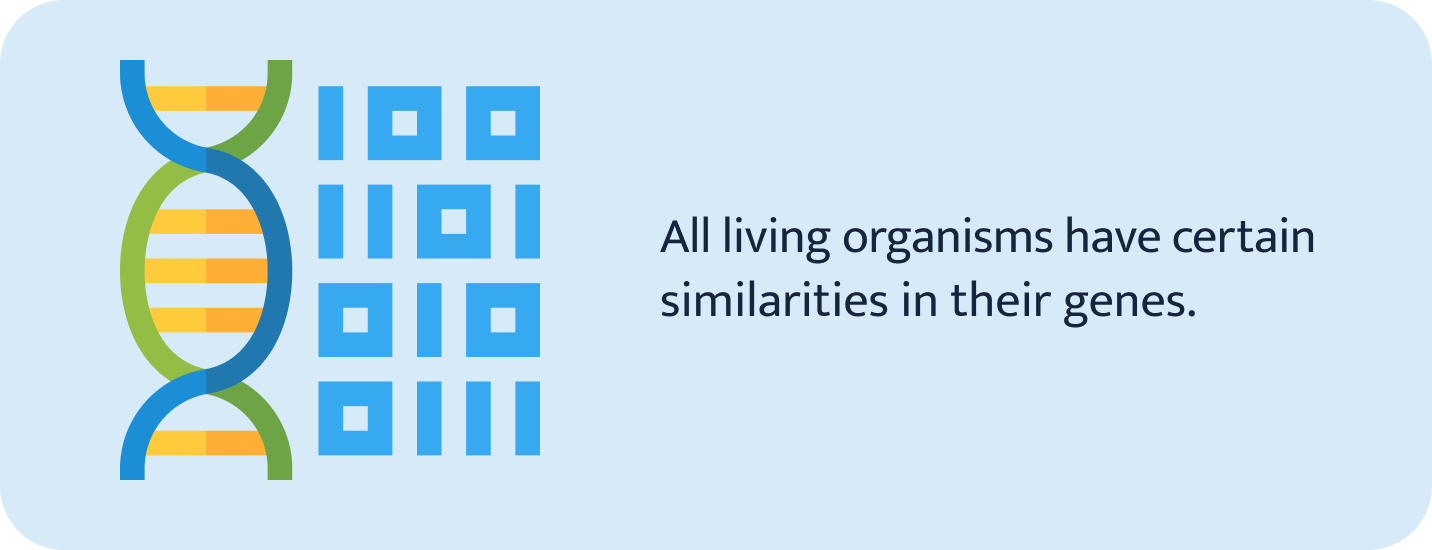
- Treating glaucoma: is surgery always necessary?
- The role of microtubules in the nervous system.
- Diffusion: means of transport within cells.
- What does the central dogma of molecular biology state?
- Trace the steps of DNA translation.
- Why do cells need to eat their dead counterparts?
- How does protein biosynthesis work?
♻️ Environmental Biology Topics to Research
Environmental biologists ensure our harmonic coexistence with nature. They are also in charge of monitoring wastewater disposal and pollution levels. This branch is closely related to ecology.
- Discuss the importance of light in different bodies of water.
- Aftermath of building the Hetch Hetchy valley dam.
- The devastating impact of deforestation in the Amazon.
- Analyze the consequences of desertification.
- How do genetically modified insects influence the environment?
- What would happen if all the bees die?
- Compare several methods of wastewater disposal.
- What were the ecological effects of Indonesia’s Mega Rice Project?
- The Great Pacific Garbage Patch: will we ever get rid of it?
- How do worms indicate the state of an ecosystem?
- Why is it important to conserve biodiversity?
- DDT: how did it affect wildlife in the US?
- What causes toxic algae bloom?
- Compare the adverse health effects of common contaminants in the air.
- The Aral Sea: how did it disappear?
- How do genetically engineered crops impact the environment?
- Indoor air pollution: causes and risks.
- The pros and cons of using natural gas .
- Trace the ecological footprint of cotton production.
- What are the ways to ensure food security without harming the environment?
🐬 Marine Biology Topics for a Paper
Fun fact: the vast majority of our oceans are still unobserved. Research in marine biology encompasses all organisms living close to or under water. Do you want to participate in uncovering the mysteries of the deep sea? This section is for you!
- How does luminescence in marine vertebrae work?
- Dolphins: how do they communicate?
- The impact of military sonar on whales.
- What makes the Galapagos Islands so unique?
- Compare different camouflage techniques of marine animals.
- How do aquatic organisms live together in coral reefs?
- Causes of high mercury concentrations in fish.
- Investigate the impact of overfishing in China.
- Explain how rising sea temperatures affect marine life.
- Contrast the survival strategies of various penguin species.
- The ethics of seafood farms.
- Examine bacteria’s contribution to biological processes in the sea.
- What are the types of invasive species?
- The contribution of birds to a stable marine ecosystem.
- Identify the biggest threats to marine biodiversity.
- Inspect the predatory behavior of starfish.
- How do corals form?
- The importance of phyto- and zooplankton to ponds.
- Whales: how did they evolve?
- What are the four types of oceanography ?
🌻 Plant Biology Research Topics
Plant biology, you guessed it, investigates plants. These green organisms are incredibly versatile. From redwood trees to algae, plants come in all sizes and shapes. Scientists use botanical knowledge to improve our food and medicine supplies. They also help to conserve forests, parks, and wilderness areas.
- What causes diseases in plants?
- What are the benefits of studying algae ?
- Recently, scientists engineered a plant to glow by itself. How does it work?
- What makes some plants toxic?
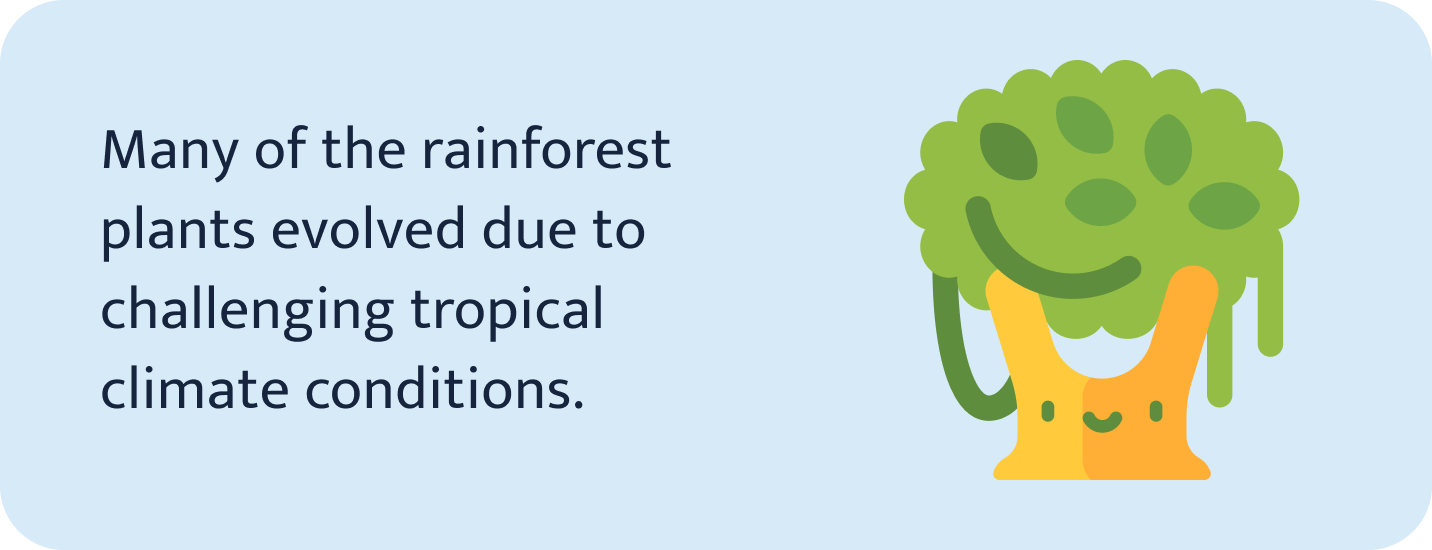
- Compare various defense mechanisms of flowers.
- Deciduous trees: what are the advantages of leaf loss?
- How do Butterworts acquire nutrition?
- Carnivorous plants: methods of luring prey.
- Types of negative feedback in plants.
- Give examples of thigmotropism. How does it work?
- What problems are associated with the definition of kingdoms?
- Investigate the anatomical structure of plant roots.
- Phytohormones: how do they influence plant growth?
- Plants and music: does sound have any measurable effects on plant development?
- How do plants produce starch?
- Why do weeds grow excessively?
- Investigate plant disease management and intervention.
- Industrial applications of synthesized plant mechanisms.
- Cacti: how do they survive in the desert?
- Examine the biological properties of medicinal herbs.
🧬 Hot Topics in Evolutionary Biology to Write About
Evolutionary biologists observe change in all living organisms. If you want to know why life on Earth is so versatile, evolutionary biology has the answer. Research areas cover ecology and genetics, as well as paleontology.
- How does stabilizing selection ensure the same phenotype for a species during evolution?
- Discuss Tinbergen’s four questions.
- What are the benefits of sexual reproduction ?
- Cancer: why does it persist?
- Society and evolution: are they connected?
- Southeast Asia and the limited occurrence of the alcohol dehydrogenase gene.
- Is there a scientific reason to divide humans into races?
- Track the evolution of aging throughout human history.
- How does speciation work?
- Genetic drift and its effects on variation.
- Describe problems concerning the Modern Synthesis.
- Selective sweeps: how likely are they to cause disease?
- What does the Red Queen hypothesis state?
- How do you determine age in herbaceous plants?
- Life history theory: how does a species’ life history influence its evolution?
- What are the ways for a species to achieve its maximum fitness?
- How did the bees learn to communicate information by dancing?
- Investigate the evolution of stamina in animal locomotion.
- How does an animal’s physiology adapt to its geographic range?
- Compare the evolutionary process of endotherms and ectotherms.
👶🧑 Developmental Biology Research Topics
When animals and plants grow, their features change. It’s no surprise: every living being starts as a single cell. It’s a long way from there to a fully formed organism! Developmental biologists track this process at different levels.
- Why are men more likely to be colorblind than women?
- What is phylogenetic niche conservatism?
- Identify origins of congenital disorders.
- What causes birds to become territorial?
- Explain the two types of developmental mechanisms.
- Why does getting older make humans more susceptible to cancer?
- Homeotic genes: how do they influence the development of body structures?
- Describe the advantages of apoptosis.
- What causes polycephaly?
- How do stem cells differentiate?
- Investigate regeneration in hydra.
- Mechanisms of metamorphosis in frogs.
- What happened during the Cambrian explosion?
- How do plants produce new structures?
- Examine the process of neurulation in fish.
- What are the types of deformations found in plants?
- Describe the ABC model of flower development.
- Why are zebrafish good model systems for developmental studies?
- Search for the origins of the vertebrate body plan.
- What does the concept of morphogen gradient say about the fate of cells?
😷 Epidemiology & Population Topics in Biology
Investigating health-related events is a part of epidemiologic research. The goal is to find out what causes diseases in a specific population. Epidemiology analyzes other health issues such as natural disasters and injuries. Population biology focuses on the interaction between populations and their environment.
- How does evolutionary game theory describe the development of a population?
- When is a strategy evolutionarily stable?
- How does phenotypic variety in plants help manage disease?
- What diseases are caused by heavy metal pollution?
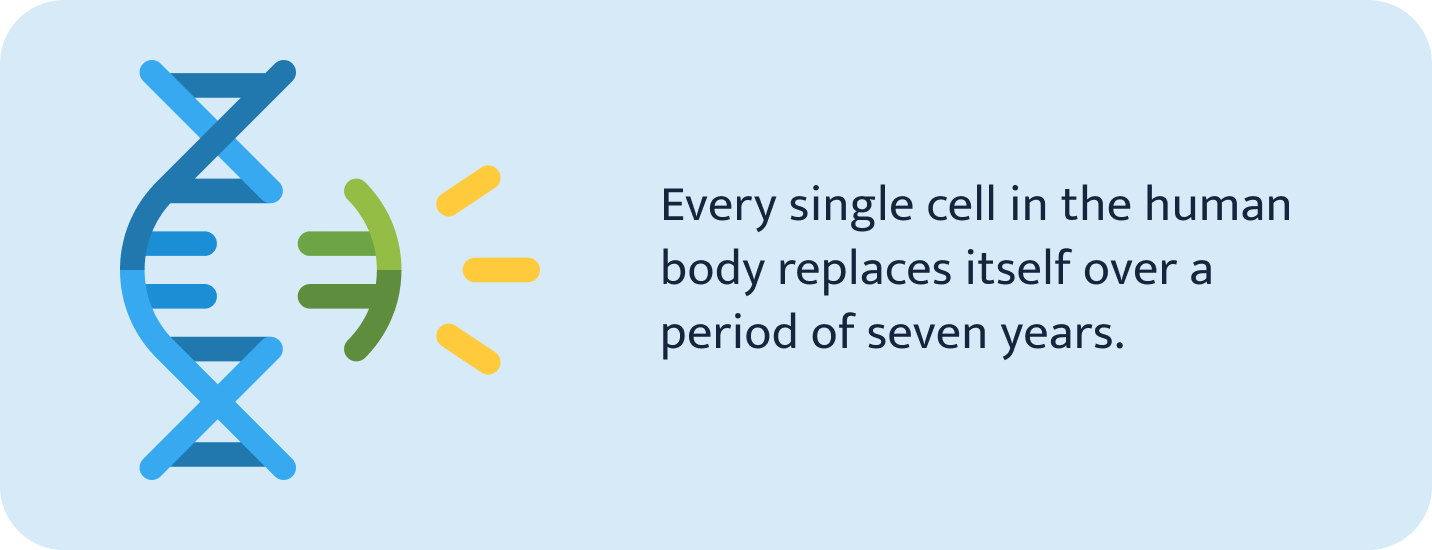
- How did the Coronavirus pandemic contribute to a rise in cases of domestic violence ?
- Reasons for an increased rate of congenital disabilities in a specific area.
- Asian carp: a harmful disruption of the marine population in American rivers.
- Compare the three kinds of population distribution.
- Examine the consequences of the 1783 Laki eruption.
- Examine various policies to moderate population growth .
- How do predator-prey dynamics work?
- Avoidance mechanisms of resource competition.
- Describe the three types of symbiotic relationships .
- How does a species regulate its abundance?
- What happens if the equilibrium state of a community is disturbed?
- Factors that encourage human population growth.
- Contrast the survivorship curves of humans, birds, and trees.
- Obesity : causes and solutions.
- Depression : how does it affect society?
- The role of causal inference in epidemiological studies .
📜 History of Biology Topics to Write About
Even before the emergence of scientific studies, humans had basic biological understanding. They were able to spot edible plants and domesticate animals. Assyrians and Babylonians were the first to implement biological knowledge. If you’re looking for a theoretical research project, this is the right research area for you.
- Explore the medical knowledge available in ancient China.
- The history of agriculture in India.
- How did the Greek philosophers theorize about the origin of life?
- Investigate the theory of the four humors.
- Aristotle’s classification of animals.
- Give an overview of discoveries in Galen’s medical writings.
- What caused the stagnation in scientific progress during the Middle Ages?
- Al-Jahiz’ discovery of the relationships between organisms.
- Albertus Magnus: what was his contribution to botany?
- How did Italy become the center for biological studies?
- What factors impacted the development of biology during the Renaissance?
- Trace the origins of modern anatomy.
- What led to the establishment of the cell theory?
- Jump starting biological progress: the invention of the microscope.
- Louis Pasteur and the dismissal of spontaneous generation.
- How did the discovery of heredity influence modern biology?
- What led to the discovery of blood circulation?
- How did the Royal Society of London impact scientific development in Europe?
- What technology helped advance biological research in the 20th century?
- The rise of bioinformatics: boosting progress in genetic data analysis.
We hope our article gave you some useful ideas for your biology paper. Good luck with your assignment!
You might also be interested in:
- A List of 212 Brilliant Research Proposal Topics to Investigate
- 220 Best Science and Technology Essay Topics to Write About
- 501 Research Questions & Titles about Science
- 300 Interesting Chemistry Topics & Writing Tips
- 150 Best Environmental Essay Topics & Questions
- 165 Health-Related Topics & Essay Ideas
- 281 Best Health & Medical Research Topics
- What is Biology?: NTNU
- High School Biology: Khan Academy
- Microbiology: University of Pittsburgh
- Human Biology: University at Albany
- Explore Topics Related to Cells: NIH
- What Is Marine Biology?: MarineBio Conservation Society
- Developmental Biology: Stanford Encyclopedia of Philosophy
- Introduction to Epidemiology: Centers for Disease Control & Prevention
- The History of Biology: Encyclopedia Britannica
- Share to Facebook
- Share to Twitter
- Share to LinkedIn
- Share to email

Culture is a set of knowledge, behaviors, and beliefs shared by a group of people. You would probably agree that it’s an integral part of humanity. It’s no wonder that students are often assigned to write about it. That’s why we came up with a list of interesting and creative...

The Earth is a complex system. To understand it, geologists examine the lithosphere and its layers. They trace our planet’s history by using physical and chemical methods. At the same time, geographers observe environmental patterns. They also focus on the interaction between humans and nature. Keep reading to find out...

Mathematics is the science of numbers and shapes. Writing about it can give you a fresh perspective and help to clarify difficult concepts. You can even use mathematical writing as a tool in problem-solving. In this article, you will find plenty of interesting math topics. Besides, you will learn about...

Cause and effect essays examine how an event happened and what consequences it had. Gaining weight after eating lots of fast food is an example of a cause-and-effect relationship. Possible topics cover a variety of subjects ranging from mental health to history and politics. This article gives you an outline...

An analysis essay aims to break down the subject in order to understand it. You can choose to analyze a text, a process, or an idea. This article will help you write a great essay! Selecting an interesting topic makes writing a lot easier. We’ve prepared a list of excellent...

Our code of ethics is derived from what we think is right or wrong. On top of that, we have to agree to the moral standards established by the society we live in. Conventional norms generally label theft, murder, or harassment as bad. However, there are many influences that impact...

A definition explains the meaning of a term or a concept. In a dictionary, you’ll find a definition in a single sentence. A definition paper, however, encompasses several paragraphs. Such an essay, amongst other things, can include personal experience and examples. To write a successful definition paper, you need to...

As simple as it is, the purpose of the descriptive essay is to explain or portray its subject. It can focus on any topic or issue you want to write about. Be sure that any middle school, high school, or college student can manage this type of creative writing assignment!...

Rhetorical analysis essay focuses on assessing the method used for delivering a message. This assignment isn’t about giving an opinion on the topic. The purpose is to analyze how the author presents the argument and whether or not they succeeded. Keep reading to find out more strategies and prompts for...

A narrative essay tells a story about a series of events. At the core of this kind of essay can be a personal experience or a fictional plot. Any story can be a basis for a narrative essay! Narratives can look similar to descriptions. Still, they are different. A descriptive...

Similar to the instructions in a recipe book, process essays convey information in a step-by-step format. In this type of paper, you follow a structured chronological process. You can also call it a how-to essay. A closely related type is a process analysis essay. Here you have to carefully consider...

In a classification essay, you divide the subject into categories. To create these categories, you single out certain attributes of things. You can classify them according to their characteristics, themes, or traits. Sounds complicated? Be sure that any high school or college student can manage this type of essay!
Home — Essay Samples — Science — Biology
Essays on Biology
Comparing and contrasting mitosis and meiosis, calorimetry lab report conclusion, made-to-order essay as fast as you need it.
Each essay is customized to cater to your unique preferences
+ experts online
Similarities of Prokaryotic and Eukaryotes
Natural selection lab report, flame test lab conclusion, the importance of biomolecules, let us write you an essay from scratch.
- 450+ experts on 30 subjects ready to help
- Custom essay delivered in as few as 3 hours
Bioinformatics: Personal Statement
Darwinism and social darwinism, darwins four components of natural selection, stem cell research: persuasive speech, get a personalized essay in under 3 hours.
Expert-written essays crafted with your exact needs in mind
The Pros and Consequences of Sodomy
Case study of pruvit keto os, pt2520 unit 1: assignment in database management, lactate dehydrogenase: an essential enzyme in metabolism, amylase: the key enzyme in carbohydrate digestion, anagene inc: case study, thesis statement for stem cell therapy, biology similarities between archaea and bacteria, 5 iodosalicylamide, topics in this category.
- Microbiology
- Photosynthesis
- Animal Cell
- Bioengineering
- Cellular Respiration
- Microorganisms
- Natural Selection
- Regeneration
- Biotechnology
- Biochemistry
Popular Categories
- Technology & Engineering
- Scientific Theories

Get Your Personalized Essay in 3 Hours or Less!
We use cookies to personalyze your web-site experience. By continuing we’ll assume you board with our cookie policy .
- Instructions Followed To The Letter
- Deadlines Met At Every Stage
- Unique And Plagiarism Free

Choose Your Test
Sat / act prep online guides and tips, the complete ib extended essay guide: examples, topics, and ideas.
International Baccalaureate (IB)

IB students around the globe fear writing the Extended Essay, but it doesn't have to be a source of stress! In this article, I'll get you excited about writing your Extended Essay and provide you with the resources you need to get an A on it.
If you're reading this article, I'm going to assume you're an IB student getting ready to write your Extended Essay. If you're looking at this as a potential future IB student, I recommend reading our introductory IB articles first, including our guide to what the IB program is and our full coverage of the IB curriculum .
IB Extended Essay: Why Should You Trust My Advice?
I myself am a recipient of an IB Diploma, and I happened to receive an A on my IB Extended Essay. Don't believe me? The proof is in the IBO pudding:

If you're confused by what this report means, EE is short for Extended Essay , and English A1 is the subject that my Extended Essay topic coordinated with. In layman's terms, my IB Diploma was graded in May 2010, I wrote my Extended Essay in the English A1 category, and I received an A grade on it.
What Is the Extended Essay in the IB Diploma Programme?
The IB Extended Essay, or EE , is a mini-thesis you write under the supervision of an IB advisor (an IB teacher at your school), which counts toward your IB Diploma (learn more about the major IB Diploma requirements in our guide) . I will explain exactly how the EE affects your Diploma later in this article.
For the Extended Essay, you will choose a research question as a topic, conduct the research independently, then write an essay on your findings . The essay itself is a long one—although there's a cap of 4,000 words, most successful essays get very close to this limit.
Keep in mind that the IB requires this essay to be a "formal piece of academic writing," meaning you'll have to do outside research and cite additional sources.
The IB Extended Essay must include the following:
- A title page
- Contents page
- Introduction
- Body of the essay
- References and bibliography
Additionally, your research topic must fall into one of the six approved DP categories , or IB subject groups, which are as follows:
- Group 1: Studies in Language and Literature
- Group 2: Language Acquisition
- Group 3: Individuals and Societies
- Group 4: Sciences
- Group 5: Mathematics
- Group 6: The Arts
Once you figure out your category and have identified a potential research topic, it's time to pick your advisor, who is normally an IB teacher at your school (though you can also find one online ). This person will help direct your research, and they'll conduct the reflection sessions you'll have to do as part of your Extended Essay.
As of 2018, the IB requires a "reflection process" as part of your EE supervision process. To fulfill this requirement, you have to meet at least three times with your supervisor in what the IB calls "reflection sessions." These meetings are not only mandatory but are also part of the formal assessment of the EE and your research methods.
According to the IB, the purpose of these meetings is to "provide an opportunity for students to reflect on their engagement with the research process." Basically, these meetings give your supervisor the opportunity to offer feedback, push you to think differently, and encourage you to evaluate your research process.
The final reflection session is called the viva voce, and it's a short 10- to 15-minute interview between you and your advisor. This happens at the very end of the EE process, and it's designed to help your advisor write their report, which factors into your EE grade.
Here are the topics covered in your viva voce :
- A check on plagiarism and malpractice
- Your reflection on your project's successes and difficulties
- Your reflection on what you've learned during the EE process
Your completed Extended Essay, along with your supervisor's report, will then be sent to the IB to be graded. We'll cover the assessment criteria in just a moment.

We'll help you learn how to have those "lightbulb" moments...even on test day!
What Should You Write About in Your IB Extended Essay?
You can technically write about anything, so long as it falls within one of the approved categories listed above.
It's best to choose a topic that matches one of the IB courses , (such as Theatre, Film, Spanish, French, Math, Biology, etc.), which shouldn't be difficult because there are so many class subjects.
Here is a range of sample topics with the attached extended essay:
- Biology: The Effect of Age and Gender on the Photoreceptor Cells in the Human Retina
- Chemistry: How Does Reflux Time Affect the Yield and Purity of Ethyl Aminobenzoate (Benzocaine), and How Effective is Recrystallisation as a Purification Technique for This Compound?
- English: An Exploration of Jane Austen's Use of the Outdoors in Emma
- Geography: The Effect of Location on the Educational Attainment of Indigenous Secondary Students in Queensland, Australia
- Math: Alhazen's Billiard Problem
- Visual Arts: Can Luc Tuymans Be Classified as a Political Painter?
You can see from how varied the topics are that you have a lot of freedom when it comes to picking a topic . So how do you pick when the options are limitless?

How to Write a Stellar IB Extended Essay: 6 Essential Tips
Below are six key tips to keep in mind as you work on your Extended Essay for the IB DP. Follow these and you're sure to get an A!
#1: Write About Something You Enjoy
You can't expect to write a compelling essay if you're not a fan of the topic on which you're writing. For example, I just love British theatre and ended up writing my Extended Essay on a revolution in post-WWII British theatre. (Yes, I'm definitely a #TheatreNerd.)
I really encourage anyone who pursues an IB Diploma to take the Extended Essay seriously. I was fortunate enough to receive a full-tuition merit scholarship to USC's School of Dramatic Arts program. In my interview for the scholarship, I spoke passionately about my Extended Essay; thus, I genuinely think my Extended Essay helped me get my scholarship.
But how do you find a topic you're passionate about? Start by thinking about which classes you enjoy the most and why . Do you like math classes because you like to solve problems? Or do you enjoy English because you like to analyze literary texts?
Keep in mind that there's no right or wrong answer when it comes to choosing your Extended Essay topic. You're not more likely to get high marks because you're writing about science, just like you're not doomed to failure because you've chosen to tackle the social sciences. The quality of what you produce—not the field you choose to research within—will determine your grade.
Once you've figured out your category, you should brainstorm more specific topics by putting pen to paper . What was your favorite chapter you learned in that class? Was it astrophysics or mechanics? What did you like about that specific chapter? Is there something you want to learn more about? I recommend spending a few hours on this type of brainstorming.
One last note: if you're truly stumped on what to research, pick a topic that will help you in your future major or career . That way you can use your Extended Essay as a talking point in your college essays (and it will prepare you for your studies to come too!).
#2: Select a Topic That Is Neither Too Broad nor Too Narrow
There's a fine line between broad and narrow. You need to write about something specific, but not so specific that you can't write 4,000 words on it.
You can't write about WWII because that would be a book's worth of material. You also don't want to write about what type of soup prisoners of war received behind enemy lines, because you probably won’t be able to come up with 4,000 words of material about it. However, you could possibly write about how the conditions in German POW camps—and the rations provided—were directly affected by the Nazis' successes and failures on the front, including the use of captured factories and prison labor in Eastern Europe to increase production. WWII military history might be a little overdone, but you get my point.
If you're really stuck trying to pinpoint a not-too-broad-or-too-narrow topic, I suggest trying to brainstorm a topic that uses a comparison. Once you begin looking through the list of sample essays below, you'll notice that many use comparisons to formulate their main arguments.
I also used a comparison in my EE, contrasting Harold Pinter's Party Time with John Osborne's Look Back in Anger in order to show a transition in British theatre. Topics with comparisons of two to three plays, books, and so on tend to be the sweet spot. You can analyze each item and then compare them with one another after doing some in-depth analysis of each individually. The ways these items compare and contrast will end up forming the thesis of your essay!
When choosing a comparative topic, the key is that the comparison should be significant. I compared two plays to illustrate the transition in British theatre, but you could compare the ways different regional dialects affect people's job prospects or how different temperatures may or may not affect the mating patterns of lightning bugs. The point here is that comparisons not only help you limit your topic, but they also help you build your argument.
Comparisons are not the only way to get a grade-A EE, though. If after brainstorming, you pick a non-comparison-based topic and are still unsure whether your topic is too broad or narrow, spend about 30 minutes doing some basic research and see how much material is out there.
If there are more than 1,000 books, articles, or documentaries out there on that exact topic, it may be too broad. But if there are only two books that have any connection to your topic, it may be too narrow. If you're still unsure, ask your advisor—it's what they're there for! Speaking of advisors...

Don't get stuck with a narrow topic!
#3: Choose an Advisor Who Is Familiar With Your Topic
If you're not certain of who you would like to be your advisor, create a list of your top three choices. Next, write down the pros and cons of each possibility (I know this sounds tedious, but it really helps!).
For example, Mr. Green is my favorite teacher and we get along really well, but he teaches English. For my EE, I want to conduct an experiment that compares the efficiency of American electric cars with foreign electric cars.
I had Ms. White a year ago. She teaches physics and enjoyed having me in her class. Unlike Mr. Green, Ms. White could help me design my experiment.
Based on my topic and what I need from my advisor, Ms. White would be a better fit for me than would Mr. Green (even though I like him a lot).
The moral of my story is this: do not just ask your favorite teacher to be your advisor . They might be a hindrance to you if they teach another subject. For example, I would not recommend asking your biology teacher to guide you in writing an English literature-based EE.
There can, of course, be exceptions to this rule. If you have a teacher who's passionate and knowledgeable about your topic (as my English teacher was about my theatre topic), you could ask that instructor. Consider all your options before you do this. There was no theatre teacher at my high school, so I couldn't find a theatre-specific advisor, but I chose the next best thing.
Before you approach a teacher to serve as your advisor, check with your high school to see what requirements they have for this process. Some IB high schools require your IB Extended Essay advisor to sign an Agreement Form , for instance.
Make sure that you ask your IB coordinator whether there is any required paperwork to fill out. If your school needs a specific form signed, bring it with you when you ask your teacher to be your EE advisor.
#4: Pick an Advisor Who Will Push You to Be Your Best
Some teachers might just take on students because they have to and aren't very passionate about reading drafts, only giving you minimal feedback. Choose a teacher who will take the time to read several drafts of your essay and give you extensive notes. I would not have gotten my A without being pushed to make my Extended Essay draft better.
Ask a teacher that you have experience with through class or an extracurricular activity. Do not ask a teacher that you have absolutely no connection to. If a teacher already knows you, that means they already know your strengths and weaknesses, so they know what to look for, where you need to improve, and how to encourage your best work.
Also, don't forget that your supervisor's assessment is part of your overall EE score . If you're meeting with someone who pushes you to do better—and you actually take their advice—they'll have more impressive things to say about you than a supervisor who doesn't know you well and isn't heavily involved in your research process.
Be aware that the IB only allows advisors to make suggestions and give constructive criticism. Your teacher cannot actually help you write your EE. The IB recommends that the supervisor spends approximately two to three hours in total with the candidate discussing the EE.
#5: Make Sure Your Essay Has a Clear Structure and Flow
The IB likes structure. Your EE needs a clear introduction (which should be one to two double-spaced pages), research question/focus (i.e., what you're investigating), a body, and a conclusion (about one double-spaced page). An essay with unclear organization will be graded poorly.
The body of your EE should make up the bulk of the essay. It should be about eight to 18 pages long (again, depending on your topic). Your body can be split into multiple parts. For example, if you were doing a comparison, you might have one third of your body as Novel A Analysis, another third as Novel B Analysis, and the final third as your comparison of Novels A and B.
If you're conducting an experiment or analyzing data, such as in this EE , your EE body should have a clear structure that aligns with the scientific method ; you should state the research question, discuss your method, present the data, analyze the data, explain any uncertainties, and draw a conclusion and/or evaluate the success of the experiment.
#6: Start Writing Sooner Rather Than Later!
You will not be able to crank out a 4,000-word essay in just a week and get an A on it. You'll be reading many, many articles (and, depending on your topic, possibly books and plays as well!). As such, it's imperative that you start your research as soon as possible.
Each school has a slightly different deadline for the Extended Essay. Some schools want them as soon as November of your senior year; others will take them as late as February. Your school will tell you what your deadline is. If they haven't mentioned it by February of your junior year, ask your IB coordinator about it.
Some high schools will provide you with a timeline of when you need to come up with a topic, when you need to meet with your advisor, and when certain drafts are due. Not all schools do this. Ask your IB coordinator if you are unsure whether you are on a specific timeline.
Below is my recommended EE timeline. While it's earlier than most schools, it'll save you a ton of heartache (trust me, I remember how hard this process was!):
- January/February of Junior Year: Come up with your final research topic (or at least your top three options).
- February of Junior Year: Approach a teacher about being your EE advisor. If they decline, keep asking others until you find one. See my notes above on how to pick an EE advisor.
- April/May of Junior Year: Submit an outline of your EE and a bibliography of potential research sources (I recommend at least seven to 10) to your EE advisor. Meet with your EE advisor to discuss your outline.
- Summer Between Junior and Senior Year: Complete your first full draft over the summer between your junior and senior year. I know, I know—no one wants to work during the summer, but trust me—this will save you so much stress come fall when you are busy with college applications and other internal assessments for your IB classes. You will want to have this first full draft done because you will want to complete a couple of draft cycles as you likely won't be able to get everything you want to say into 4,000 articulate words on the first attempt. Try to get this first draft into the best possible shape so you don't have to work on too many revisions during the school year on top of your homework, college applications, and extracurriculars.
- August/September of Senior Year: Turn in your first draft of your EE to your advisor and receive feedback. Work on incorporating their feedback into your essay. If they have a lot of suggestions for improvement, ask if they will read one more draft before the final draft.
- September/October of Senior Year: Submit the second draft of your EE to your advisor (if necessary) and look at their feedback. Work on creating the best possible final draft.
- November-February of Senior Year: Schedule your viva voce. Submit two copies of your final draft to your school to be sent off to the IB. You likely will not get your grade until after you graduate.
Remember that in the middle of these milestones, you'll need to schedule two other reflection sessions with your advisor . (Your teachers will actually take notes on these sessions on a form like this one , which then gets submitted to the IB.)
I recommend doing them when you get feedback on your drafts, but these meetings will ultimately be up to your supervisor. Just don't forget to do them!

The early bird DOES get the worm!
How Is the IB Extended Essay Graded?
Extended Essays are graded by examiners appointed by the IB on a scale of 0 to 34 . You'll be graded on five criteria, each with its own set of points. You can learn more about how EE scoring works by reading the IB guide to extended essays .
- Criterion A: Focus and Method (6 points maximum)
- Criterion B: Knowledge and Understanding (6 points maximum)
- Criterion C: Critical Thinking (12 points maximum)
- Criterion D: Presentation (4 points maximum)
- Criterion E: Engagement (6 points maximum)
How well you do on each of these criteria will determine the final letter grade you get for your EE. You must earn at least a D to be eligible to receive your IB Diploma.
Although each criterion has a point value, the IB explicitly states that graders are not converting point totals into grades; instead, they're using qualitative grade descriptors to determine the final grade of your Extended Essay . Grade descriptors are on pages 102-103 of this document .
Here's a rough estimate of how these different point values translate to letter grades based on previous scoring methods for the EE. This is just an estimate —you should read and understand the grade descriptors so you know exactly what the scorers are looking for.
Here is the breakdown of EE scores (from the May 2021 bulletin):
How Does the Extended Essay Grade Affect Your IB Diploma?
The Extended Essay grade is combined with your TOK (Theory of Knowledge) grade to determine how many points you get toward your IB Diploma.
To learn about Theory of Knowledge or how many points you need to receive an IB Diploma, read our complete guide to the IB program and our guide to the IB Diploma requirements .
This diagram shows how the two scores are combined to determine how many points you receive for your IB diploma (3 being the most, 0 being the least). In order to get your IB Diploma, you have to earn 24 points across both categories (the TOK and EE). The highest score anyone can earn is 45 points.

Let's say you get an A on your EE and a B on TOK. You will get 3 points toward your Diploma. As of 2014, a student who scores an E on either the extended essay or TOK essay will not be eligible to receive an IB Diploma .
Prior to the class of 2010, a Diploma candidate could receive a failing grade in either the Extended Essay or Theory of Knowledge and still be awarded a Diploma, but this is no longer true.
Figuring out how you're assessed can be a little tricky. Luckily, the IB breaks everything down here in this document . (The assessment information begins on page 219.)
40+ Sample Extended Essays for the IB Diploma Programme
In case you want a little more guidance on how to get an A on your EE, here are over 40 excellent (grade A) sample extended essays for your reading pleasure. Essays are grouped by IB subject.
- Business Management 1
- Chemistry 1
- Chemistry 2
- Chemistry 3
- Chemistry 4
- Chemistry 5
- Chemistry 6
- Chemistry 7
- Computer Science 1
- Economics 1
- Design Technology 1
- Design Technology 2
- Environmental Systems and Societies 1
- Geography 1
- Geography 2
- Geography 3
- Geography 4
- Geography 5
- Geography 6
- Literature and Performance 1
- Mathematics 1
- Mathematics 2
- Mathematics 3
- Mathematics 4
- Mathematics 5
- Philosophy 1
- Philosophy 2
- Philosophy 3
- Philosophy 4
- Philosophy 5
- Psychology 1
- Psychology 2
- Psychology 3
- Psychology 4
- Psychology 5
- Social and Cultural Anthropology 1
- Social and Cultural Anthropology 2
- Social and Cultural Anthropology 3
- Sports, Exercise and Health Science 1
- Sports, Exercise and Health Science 2
- Visual Arts 1
- Visual Arts 2
- Visual Arts 3
- Visual Arts 4
- Visual Arts 5
- World Religion 1
- World Religion 2
- World Religion 3

What's Next?
Trying to figure out what extracurriculars you should do? Learn more about participating in the Science Olympiad , starting a club , doing volunteer work , and joining Student Government .
Studying for the SAT? Check out our expert study guide to the SAT . Taking the SAT in a month or so? Learn how to cram effectively for this important test .
Not sure where you want to go to college? Read our guide to finding your target school . Also, determine your target SAT score or target ACT score .

As an SAT/ACT tutor, Dora has guided many students to test prep success. She loves watching students succeed and is committed to helping you get there. Dora received a full-tuition merit based scholarship to University of Southern California. She graduated magna cum laude and scored in the 99th percentile on the ACT. She is also passionate about acting, writing, and photography.
Ask a Question Below
Have any questions about this article or other topics? Ask below and we'll reply!
Improve With Our Famous Guides
- For All Students
The 5 Strategies You Must Be Using to Improve 160+ SAT Points
How to Get a Perfect 1600, by a Perfect Scorer
Series: How to Get 800 on Each SAT Section:
Score 800 on SAT Math
Score 800 on SAT Reading
Score 800 on SAT Writing
Series: How to Get to 600 on Each SAT Section:
Score 600 on SAT Math
Score 600 on SAT Reading
Score 600 on SAT Writing
Free Complete Official SAT Practice Tests
What SAT Target Score Should You Be Aiming For?
15 Strategies to Improve Your SAT Essay
The 5 Strategies You Must Be Using to Improve 4+ ACT Points
How to Get a Perfect 36 ACT, by a Perfect Scorer
Series: How to Get 36 on Each ACT Section:
36 on ACT English
36 on ACT Math
36 on ACT Reading
36 on ACT Science
Series: How to Get to 24 on Each ACT Section:
24 on ACT English
24 on ACT Math
24 on ACT Reading
24 on ACT Science
What ACT target score should you be aiming for?
ACT Vocabulary You Must Know
ACT Writing: 15 Tips to Raise Your Essay Score
How to Get Into Harvard and the Ivy League
How to Get a Perfect 4.0 GPA
How to Write an Amazing College Essay
What Exactly Are Colleges Looking For?
Is the ACT easier than the SAT? A Comprehensive Guide
Should you retake your SAT or ACT?
When should you take the SAT or ACT?
Stay Informed
Get the latest articles and test prep tips!
Looking for Graduate School Test Prep?
Check out our top-rated graduate blogs here:
GRE Online Prep Blog
GMAT Online Prep Blog
TOEFL Online Prep Blog
Holly R. "I am absolutely overjoyed and cannot thank you enough for helping me!”
Calculate for all schools
Your chance of acceptance, your chancing factors, extracurriculars, how to write a 'why biology' major essay.
I'm a high school junior applying to college soon, and I'm working on my application essays. One question asks me to explain why I'm interested in majoring in Biology. Can you guys suggest some elements I should include in the essay? How can I make my passion for biology stand out?
When writing a 'Why Biology' major essay, it's essential to focus on your personal experiences, passion, and future goals related to the subject. Here are some elements you can include in the essay to make it stand out:
1. Personal exposure: Highlight any experiences that sparked your interest in biology. Did you have a inspiring biology teacher or an exciting lab experiment? Maybe you joined a biology club or participated in a science fair project? Connect these experiences to your passion for the subject.
2. Academic achievements: Reflect on any notable academic accomplishments you have had in biology, such as high grades, taking AP or advanced level courses, or receiving awards/recognitions for your work in the subject. This shows your dedication and success within the field.
3. Extracurricular activities: Discuss any relevant extracurricular activities showcasing your involvement and commitment to biology, such as internships, volunteering, research projects, or summer programs related to the subject. Elaborate on how these experiences deepened your passion and understanding of biology.
4. Specific topics of interest: Describe the areas within biology that you find particularly fascinating or captivating, such as genetics, molecular biology, neuroscience, or ecology. By narrowing the focus, you demonstrate a clear understanding of the discipline and its subfields.
5. How your passion has evolved: Explain how your interest in biology started and the ways it has grown over time. This shows your commitment to understanding the subject on a deeper level, and it will allow the admissions committee to see how you've continued to explore and expand your passion for biology.
6. Future plans and goals: Talk about your long-term career aspirations or academic goals in biology and how majoring in the subject will help you achieve them. For example, you could mention your desire to pursue research, medicine, biotechnology, or conservation. Connecting your major to future plans showcases your motivation and seriousness about studying biology.
7. College-specific resources: Mention specific programs, faculty, research opportunities, or facilities that the college you're applying to offers within the biology department. Explain how these resources will help you reach your academic goals and deepen your passion for the subject.
For more details on writing a "Why This Major?" essay, check out this CollegeVine article: https://blog.collegevine.com/why-this-major-college-essay
In conclusion, make sure to focus on your personal experiences, achievements, and aspirations regarding biology, and convey your genuine enthusiasm and dedication to the subject. By incorporating these various elements into your essay, you'll demonstrate a well-rounded understanding of and passion for biology, which will make your essay stand out.
About CollegeVine’s Expert FAQ
CollegeVine’s Q&A seeks to offer informed perspectives on commonly asked admissions questions. Every answer is refined and validated by our team of admissions experts to ensure it resonates with trusted knowledge in the field.
- Search Menu
- Browse content in Arts and Humanities
- Browse content in Archaeology
- Anglo-Saxon and Medieval Archaeology
- Archaeological Methodology and Techniques
- Archaeology by Region
- Archaeology of Religion
- Archaeology of Trade and Exchange
- Biblical Archaeology
- Contemporary and Public Archaeology
- Environmental Archaeology
- Historical Archaeology
- History and Theory of Archaeology
- Industrial Archaeology
- Landscape Archaeology
- Mortuary Archaeology
- Prehistoric Archaeology
- Underwater Archaeology
- Urban Archaeology
- Zooarchaeology
- Browse content in Architecture
- Architectural Structure and Design
- History of Architecture
- Residential and Domestic Buildings
- Theory of Architecture
- Browse content in Art
- Art Subjects and Themes
- History of Art
- Industrial and Commercial Art
- Theory of Art
- Biographical Studies
- Byzantine Studies
- Browse content in Classical Studies
- Classical History
- Classical Philosophy
- Classical Mythology
- Classical Literature
- Classical Reception
- Classical Art and Architecture
- Classical Oratory and Rhetoric
- Greek and Roman Epigraphy
- Greek and Roman Law
- Greek and Roman Archaeology
- Greek and Roman Papyrology
- Late Antiquity
- Religion in the Ancient World
- Digital Humanities
- Browse content in History
- Colonialism and Imperialism
- Diplomatic History
- Environmental History
- Genealogy, Heraldry, Names, and Honours
- Genocide and Ethnic Cleansing
- Historical Geography
- History by Period
- History of Agriculture
- History of Education
- History of Emotions
- History of Gender and Sexuality
- Industrial History
- Intellectual History
- International History
- Labour History
- Legal and Constitutional History
- Local and Family History
- Maritime History
- Military History
- National Liberation and Post-Colonialism
- Oral History
- Political History
- Public History
- Regional and National History
- Revolutions and Rebellions
- Slavery and Abolition of Slavery
- Social and Cultural History
- Theory, Methods, and Historiography
- Urban History
- World History
- Browse content in Language Teaching and Learning
- Language Learning (Specific Skills)
- Language Teaching Theory and Methods
- Browse content in Linguistics
- Applied Linguistics
- Cognitive Linguistics
- Computational Linguistics
- Forensic Linguistics
- Grammar, Syntax and Morphology
- Historical and Diachronic Linguistics
- History of English
- Language Acquisition
- Language Variation
- Language Families
- Language Evolution
- Language Reference
- Lexicography
- Linguistic Theories
- Linguistic Typology
- Linguistic Anthropology
- Phonetics and Phonology
- Psycholinguistics
- Sociolinguistics
- Translation and Interpretation
- Writing Systems
- Browse content in Literature
- Bibliography
- Children's Literature Studies
- Literary Studies (Asian)
- Literary Studies (European)
- Literary Studies (Eco-criticism)
- Literary Studies (Modernism)
- Literary Studies (Romanticism)
- Literary Studies (American)
- Literary Studies - World
- Literary Studies (1500 to 1800)
- Literary Studies (19th Century)
- Literary Studies (20th Century onwards)
- Literary Studies (African American Literature)
- Literary Studies (British and Irish)
- Literary Studies (Early and Medieval)
- Literary Studies (Fiction, Novelists, and Prose Writers)
- Literary Studies (Gender Studies)
- Literary Studies (Graphic Novels)
- Literary Studies (History of the Book)
- Literary Studies (Plays and Playwrights)
- Literary Studies (Poetry and Poets)
- Literary Studies (Postcolonial Literature)
- Literary Studies (Queer Studies)
- Literary Studies (Science Fiction)
- Literary Studies (Travel Literature)
- Literary Studies (War Literature)
- Literary Studies (Women's Writing)
- Literary Theory and Cultural Studies
- Mythology and Folklore
- Shakespeare Studies and Criticism
- Browse content in Media Studies
- Browse content in Music
- Applied Music
- Dance and Music
- Ethics in Music
- Ethnomusicology
- Gender and Sexuality in Music
- Medicine and Music
- Music Cultures
- Music and Religion
- Music and Culture
- Music and Media
- Music Education and Pedagogy
- Music Theory and Analysis
- Musical Scores, Lyrics, and Libretti
- Musical Structures, Styles, and Techniques
- Musicology and Music History
- Performance Practice and Studies
- Race and Ethnicity in Music
- Sound Studies
- Browse content in Performing Arts
- Browse content in Philosophy
- Aesthetics and Philosophy of Art
- Epistemology
- Feminist Philosophy
- History of Western Philosophy
- Metaphysics
- Moral Philosophy
- Non-Western Philosophy
- Philosophy of Science
- Philosophy of Action
- Philosophy of Law
- Philosophy of Religion
- Philosophy of Language
- Philosophy of Mind
- Philosophy of Perception
- Philosophy of Mathematics and Logic
- Practical Ethics
- Social and Political Philosophy
- Browse content in Religion
- Biblical Studies
- Christianity
- East Asian Religions
- History of Religion
- Judaism and Jewish Studies
- Qumran Studies
- Religion and Education
- Religion and Health
- Religion and Politics
- Religion and Science
- Religion and Law
- Religion and Art, Literature, and Music
- Religious Studies
- Browse content in Society and Culture
- Cookery, Food, and Drink
- Cultural Studies
- Customs and Traditions
- Ethical Issues and Debates
- Hobbies, Games, Arts and Crafts
- Lifestyle, Home, and Garden
- Natural world, Country Life, and Pets
- Popular Beliefs and Controversial Knowledge
- Sports and Outdoor Recreation
- Technology and Society
- Travel and Holiday
- Visual Culture
- Browse content in Law
- Arbitration
- Browse content in Company and Commercial Law
- Commercial Law
- Company Law
- Browse content in Comparative Law
- Systems of Law
- Competition Law
- Browse content in Constitutional and Administrative Law
- Government Powers
- Judicial Review
- Local Government Law
- Military and Defence Law
- Parliamentary and Legislative Practice
- Construction Law
- Contract Law
- Browse content in Criminal Law
- Criminal Procedure
- Criminal Evidence Law
- Sentencing and Punishment
- Employment and Labour Law
- Environment and Energy Law
- Browse content in Financial Law
- Banking Law
- Insolvency Law
- History of Law
- Human Rights and Immigration
- Intellectual Property Law
- Browse content in International Law
- Private International Law and Conflict of Laws
- Public International Law
- IT and Communications Law
- Jurisprudence and Philosophy of Law
- Law and Politics
- Law and Society
- Browse content in Legal System and Practice
- Courts and Procedure
- Legal Skills and Practice
- Primary Sources of Law
- Regulation of Legal Profession
- Medical and Healthcare Law
- Browse content in Policing
- Criminal Investigation and Detection
- Police and Security Services
- Police Procedure and Law
- Police Regional Planning
- Browse content in Property Law
- Personal Property Law
- Study and Revision
- Terrorism and National Security Law
- Browse content in Trusts Law
- Wills and Probate or Succession
- Browse content in Medicine and Health
- Browse content in Allied Health Professions
- Arts Therapies
- Clinical Science
- Dietetics and Nutrition
- Occupational Therapy
- Operating Department Practice
- Physiotherapy
- Radiography
- Speech and Language Therapy
- Browse content in Anaesthetics
- General Anaesthesia
- Neuroanaesthesia
- Browse content in Clinical Medicine
- Acute Medicine
- Cardiovascular Medicine
- Clinical Genetics
- Clinical Pharmacology and Therapeutics
- Dermatology
- Endocrinology and Diabetes
- Gastroenterology
- Genito-urinary Medicine
- Geriatric Medicine
- Infectious Diseases
- Medical Oncology
- Medical Toxicology
- Pain Medicine
- Palliative Medicine
- Rehabilitation Medicine
- Respiratory Medicine and Pulmonology
- Rheumatology
- Sleep Medicine
- Sports and Exercise Medicine
- Clinical Neuroscience
- Community Medical Services
- Critical Care
- Emergency Medicine
- Forensic Medicine
- Haematology
- History of Medicine
- Browse content in Medical Dentistry
- Oral and Maxillofacial Surgery
- Paediatric Dentistry
- Restorative Dentistry and Orthodontics
- Surgical Dentistry
- Medical Ethics
- Browse content in Medical Skills
- Clinical Skills
- Communication Skills
- Nursing Skills
- Surgical Skills
- Medical Statistics and Methodology
- Browse content in Neurology
- Clinical Neurophysiology
- Neuropathology
- Nursing Studies
- Browse content in Obstetrics and Gynaecology
- Gynaecology
- Occupational Medicine
- Ophthalmology
- Otolaryngology (ENT)
- Browse content in Paediatrics
- Neonatology
- Browse content in Pathology
- Chemical Pathology
- Clinical Cytogenetics and Molecular Genetics
- Histopathology
- Medical Microbiology and Virology
- Patient Education and Information
- Browse content in Pharmacology
- Psychopharmacology
- Browse content in Popular Health
- Caring for Others
- Complementary and Alternative Medicine
- Self-help and Personal Development
- Browse content in Preclinical Medicine
- Cell Biology
- Molecular Biology and Genetics
- Reproduction, Growth and Development
- Primary Care
- Professional Development in Medicine
- Browse content in Psychiatry
- Addiction Medicine
- Child and Adolescent Psychiatry
- Forensic Psychiatry
- Learning Disabilities
- Old Age Psychiatry
- Psychotherapy
- Browse content in Public Health and Epidemiology
- Epidemiology
- Public Health
- Browse content in Radiology
- Clinical Radiology
- Interventional Radiology
- Nuclear Medicine
- Radiation Oncology
- Reproductive Medicine
- Browse content in Surgery
- Cardiothoracic Surgery
- Gastro-intestinal and Colorectal Surgery
- General Surgery
- Neurosurgery
- Paediatric Surgery
- Peri-operative Care
- Plastic and Reconstructive Surgery
- Surgical Oncology
- Transplant Surgery
- Trauma and Orthopaedic Surgery
- Vascular Surgery
- Browse content in Science and Mathematics
- Browse content in Biological Sciences
- Aquatic Biology
- Biochemistry
- Bioinformatics and Computational Biology
- Developmental Biology
- Ecology and Conservation
- Evolutionary Biology
- Genetics and Genomics
- Microbiology
- Molecular and Cell Biology
- Natural History
- Plant Sciences and Forestry
- Research Methods in Life Sciences
- Structural Biology
- Systems Biology
- Zoology and Animal Sciences
- Browse content in Chemistry
- Analytical Chemistry
- Computational Chemistry
- Crystallography
- Environmental Chemistry
- Industrial Chemistry
- Inorganic Chemistry
- Materials Chemistry
- Medicinal Chemistry
- Mineralogy and Gems
- Organic Chemistry
- Physical Chemistry
- Polymer Chemistry
- Study and Communication Skills in Chemistry
- Theoretical Chemistry
- Browse content in Computer Science
- Artificial Intelligence
- Computer Architecture and Logic Design
- Game Studies
- Human-Computer Interaction
- Mathematical Theory of Computation
- Programming Languages
- Software Engineering
- Systems Analysis and Design
- Virtual Reality
- Browse content in Computing
- Business Applications
- Computer Security
- Computer Games
- Computer Networking and Communications
- Digital Lifestyle
- Graphical and Digital Media Applications
- Operating Systems
- Browse content in Earth Sciences and Geography
- Atmospheric Sciences
- Environmental Geography
- Geology and the Lithosphere
- Maps and Map-making
- Meteorology and Climatology
- Oceanography and Hydrology
- Palaeontology
- Physical Geography and Topography
- Regional Geography
- Soil Science
- Urban Geography
- Browse content in Engineering and Technology
- Agriculture and Farming
- Biological Engineering
- Civil Engineering, Surveying, and Building
- Electronics and Communications Engineering
- Energy Technology
- Engineering (General)
- Environmental Science, Engineering, and Technology
- History of Engineering and Technology
- Mechanical Engineering and Materials
- Technology of Industrial Chemistry
- Transport Technology and Trades
- Browse content in Environmental Science
- Applied Ecology (Environmental Science)
- Conservation of the Environment (Environmental Science)
- Environmental Sustainability
- Environmentalist Thought and Ideology (Environmental Science)
- Management of Land and Natural Resources (Environmental Science)
- Natural Disasters (Environmental Science)
- Nuclear Issues (Environmental Science)
- Pollution and Threats to the Environment (Environmental Science)
- Social Impact of Environmental Issues (Environmental Science)
- History of Science and Technology
- Browse content in Materials Science
- Ceramics and Glasses
- Composite Materials
- Metals, Alloying, and Corrosion
- Nanotechnology
- Browse content in Mathematics
- Applied Mathematics
- Biomathematics and Statistics
- History of Mathematics
- Mathematical Education
- Mathematical Finance
- Mathematical Analysis
- Numerical and Computational Mathematics
- Probability and Statistics
- Pure Mathematics
- Browse content in Neuroscience
- Cognition and Behavioural Neuroscience
- Development of the Nervous System
- Disorders of the Nervous System
- History of Neuroscience
- Invertebrate Neurobiology
- Molecular and Cellular Systems
- Neuroendocrinology and Autonomic Nervous System
- Neuroscientific Techniques
- Sensory and Motor Systems
- Browse content in Physics
- Astronomy and Astrophysics
- Atomic, Molecular, and Optical Physics
- Biological and Medical Physics
- Classical Mechanics
- Computational Physics
- Condensed Matter Physics
- Electromagnetism, Optics, and Acoustics
- History of Physics
- Mathematical and Statistical Physics
- Measurement Science
- Nuclear Physics
- Particles and Fields
- Plasma Physics
- Quantum Physics
- Relativity and Gravitation
- Semiconductor and Mesoscopic Physics
- Browse content in Psychology
- Affective Sciences
- Clinical Psychology
- Cognitive Neuroscience
- Cognitive Psychology
- Criminal and Forensic Psychology
- Developmental Psychology
- Educational Psychology
- Evolutionary Psychology
- Health Psychology
- History and Systems in Psychology
- Music Psychology
- Neuropsychology
- Organizational Psychology
- Psychological Assessment and Testing
- Psychology of Human-Technology Interaction
- Psychology Professional Development and Training
- Research Methods in Psychology
- Social Psychology
- Browse content in Social Sciences
- Browse content in Anthropology
- Anthropology of Religion
- Human Evolution
- Medical Anthropology
- Physical Anthropology
- Regional Anthropology
- Social and Cultural Anthropology
- Theory and Practice of Anthropology
- Browse content in Business and Management
- Business Strategy
- Business History
- Business Ethics
- Business and Government
- Business and Technology
- Business and the Environment
- Comparative Management
- Corporate Governance
- Corporate Social Responsibility
- Entrepreneurship
- Health Management
- Human Resource Management
- Industrial and Employment Relations
- Industry Studies
- Information and Communication Technologies
- International Business
- Knowledge Management
- Management and Management Techniques
- Operations Management
- Organizational Theory and Behaviour
- Pensions and Pension Management
- Public and Nonprofit Management
- Strategic Management
- Supply Chain Management
- Browse content in Criminology and Criminal Justice
- Criminal Justice
- Criminology
- Forms of Crime
- International and Comparative Criminology
- Youth Violence and Juvenile Justice
- Development Studies
- Browse content in Economics
- Agricultural, Environmental, and Natural Resource Economics
- Asian Economics
- Behavioural Finance
- Behavioural Economics and Neuroeconomics
- Econometrics and Mathematical Economics
- Economic Systems
- Economic Methodology
- Economic History
- Economic Development and Growth
- Financial Markets
- Financial Institutions and Services
- General Economics and Teaching
- Health, Education, and Welfare
- History of Economic Thought
- International Economics
- Labour and Demographic Economics
- Law and Economics
- Macroeconomics and Monetary Economics
- Microeconomics
- Public Economics
- Urban, Rural, and Regional Economics
- Welfare Economics
- Browse content in Education
- Adult Education and Continuous Learning
- Care and Counselling of Students
- Early Childhood and Elementary Education
- Educational Equipment and Technology
- Educational Strategies and Policy
- Higher and Further Education
- Organization and Management of Education
- Philosophy and Theory of Education
- Schools Studies
- Secondary Education
- Teaching of a Specific Subject
- Teaching of Specific Groups and Special Educational Needs
- Teaching Skills and Techniques
- Browse content in Environment
- Applied Ecology (Social Science)
- Climate Change
- Conservation of the Environment (Social Science)
- Environmentalist Thought and Ideology (Social Science)
- Natural Disasters (Environment)
- Social Impact of Environmental Issues (Social Science)
- Browse content in Human Geography
- Cultural Geography
- Economic Geography
- Political Geography
- Browse content in Interdisciplinary Studies
- Communication Studies
- Museums, Libraries, and Information Sciences
- Browse content in Politics
- African Politics
- Asian Politics
- Chinese Politics
- Comparative Politics
- Conflict Politics
- Elections and Electoral Studies
- Environmental Politics
- European Union
- Foreign Policy
- Gender and Politics
- Human Rights and Politics
- Indian Politics
- International Relations
- International Organization (Politics)
- International Political Economy
- Irish Politics
- Latin American Politics
- Middle Eastern Politics
- Political Methodology
- Political Communication
- Political Philosophy
- Political Sociology
- Political Theory
- Political Behaviour
- Political Economy
- Political Institutions
- Politics and Law
- Public Administration
- Public Policy
- Quantitative Political Methodology
- Regional Political Studies
- Russian Politics
- Security Studies
- State and Local Government
- UK Politics
- US Politics
- Browse content in Regional and Area Studies
- African Studies
- Asian Studies
- East Asian Studies
- Japanese Studies
- Latin American Studies
- Middle Eastern Studies
- Native American Studies
- Scottish Studies
- Browse content in Research and Information
- Research Methods
- Browse content in Social Work
- Addictions and Substance Misuse
- Adoption and Fostering
- Care of the Elderly
- Child and Adolescent Social Work
- Couple and Family Social Work
- Developmental and Physical Disabilities Social Work
- Direct Practice and Clinical Social Work
- Emergency Services
- Human Behaviour and the Social Environment
- International and Global Issues in Social Work
- Mental and Behavioural Health
- Social Justice and Human Rights
- Social Policy and Advocacy
- Social Work and Crime and Justice
- Social Work Macro Practice
- Social Work Practice Settings
- Social Work Research and Evidence-based Practice
- Welfare and Benefit Systems
- Browse content in Sociology
- Childhood Studies
- Community Development
- Comparative and Historical Sociology
- Economic Sociology
- Gender and Sexuality
- Gerontology and Ageing
- Health, Illness, and Medicine
- Marriage and the Family
- Migration Studies
- Occupations, Professions, and Work
- Organizations
- Population and Demography
- Race and Ethnicity
- Social Theory
- Social Movements and Social Change
- Social Research and Statistics
- Social Stratification, Inequality, and Mobility
- Sociology of Religion
- Sociology of Education
- Sport and Leisure
- Urban and Rural Studies
- Browse content in Warfare and Defence
- Defence Strategy, Planning, and Research
- Land Forces and Warfare
- Military Administration
- Military Life and Institutions
- Naval Forces and Warfare
- Other Warfare and Defence Issues
- Peace Studies and Conflict Resolution
- Weapons and Equipment

Processes of Life: Essays in the Philosophy of Biology
- Cite Icon Cite
- Permissions Icon Permissions
This volume collects essays written by John Dupré during his time as Director of the ESRC centre for Genomics in Society, and reflects his interest in the implications of emerging ideas in biology for philosophy. Particular interests include: epigenetics and related areas of molecular biology that have eroded the exceptional status of the gene, and presented the genome as fully interactive with the rest of the cell; developmental systems theory which, especially in the light of epigenetics, provides a space for a vision of evolution that takes full account of the fundamental importance of developmental processes; and microbiology, the elephant in the room of contemporary philosophy of biology. The emphasis on the importance of microbes is perhaps the most distinctive theme of the essays, and one that is shown to subvert such basic biological assumptions as the organization of biological kinds on a branching Tree of Life, and the simple traditional conception of the biological organism. These topics are understood in the context of a view of science, partly taken from earlier work, but developed further in some of the present essays, as realistically grounded in the natural order, but at the same time pluralistic and inextricably integrated within a social and normative context. Topics to which these philosophical and scientific ideas are addressed include the nature of the organism, the limits of neo-Darwinian evolutionary theory, the significance of genomics, the biological status of human races, and the evolutionary and developmental plasticity of human nature.
Signed in as
Institutional accounts.
- Google Scholar Indexing
- GoogleCrawler [DO NOT DELETE]
Personal account
- Sign in with email/username & password
- Get email alerts
- Save searches
- Purchase content
- Activate your purchase/trial code
- Add your ORCID iD
Institutional access
Sign in with a library card.
- Sign in with username/password
- Recommend to your librarian
- Institutional account management
- Get help with access
Access to content on Oxford Academic is often provided through institutional subscriptions and purchases. If you are a member of an institution with an active account, you may be able to access content in one of the following ways:
IP based access
Typically, access is provided across an institutional network to a range of IP addresses. This authentication occurs automatically, and it is not possible to sign out of an IP authenticated account.
Sign in through your institution
Choose this option to get remote access when outside your institution. Shibboleth/Open Athens technology is used to provide single sign-on between your institution’s website and Oxford Academic.
- Click Sign in through your institution.
- Select your institution from the list provided, which will take you to your institution's website to sign in.
- When on the institution site, please use the credentials provided by your institution. Do not use an Oxford Academic personal account.
- Following successful sign in, you will be returned to Oxford Academic.
If your institution is not listed or you cannot sign in to your institution’s website, please contact your librarian or administrator.
Enter your library card number to sign in. If you cannot sign in, please contact your librarian.
Society Members
Society member access to a journal is achieved in one of the following ways:
Sign in through society site
Many societies offer single sign-on between the society website and Oxford Academic. If you see ‘Sign in through society site’ in the sign in pane within a journal:
- Click Sign in through society site.
- When on the society site, please use the credentials provided by that society. Do not use an Oxford Academic personal account.
If you do not have a society account or have forgotten your username or password, please contact your society.
Sign in using a personal account
Some societies use Oxford Academic personal accounts to provide access to their members. See below.
A personal account can be used to get email alerts, save searches, purchase content, and activate subscriptions.
Some societies use Oxford Academic personal accounts to provide access to their members.
Viewing your signed in accounts
Click the account icon in the top right to:
- View your signed in personal account and access account management features.
- View the institutional accounts that are providing access.
Signed in but can't access content
Oxford Academic is home to a wide variety of products. The institutional subscription may not cover the content that you are trying to access. If you believe you should have access to that content, please contact your librarian.
For librarians and administrators, your personal account also provides access to institutional account management. Here you will find options to view and activate subscriptions, manage institutional settings and access options, access usage statistics, and more.
Our books are available by subscription or purchase to libraries and institutions.
- About Oxford Academic
- Publish journals with us
- University press partners
- What we publish
- New features
- Open access
- Rights and permissions
- Accessibility
- Advertising
- Media enquiries
- Oxford University Press
- Oxford Languages
- University of Oxford
Oxford University Press is a department of the University of Oxford. It furthers the University's objective of excellence in research, scholarship, and education by publishing worldwide
- Copyright © 2024 Oxford University Press
- Cookie settings
- Cookie policy
- Privacy policy
- Legal notice
This Feature Is Available To Subscribers Only
Sign In or Create an Account
This PDF is available to Subscribers Only
For full access to this pdf, sign in to an existing account, or purchase an annual subscription.

Building embryos
For 3,000 years, humans have struggled to understand the embryo. Now there is a revolution underway
John Wallingford

Why do the building blocks of life possess a mysterious symmetry?
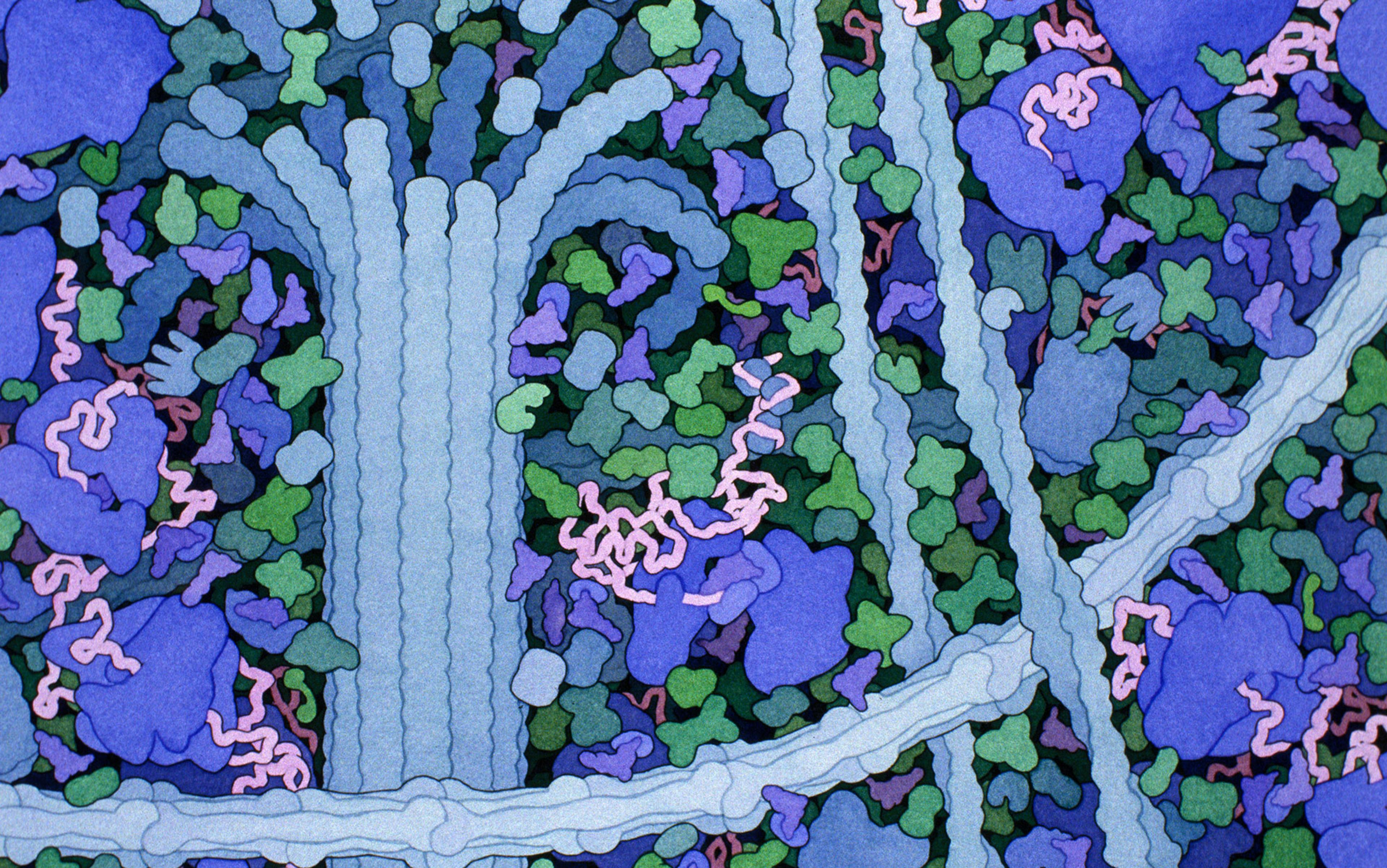
The cell is not a factory
Scientific narratives project social hierarchies onto nature. That’s why we need better metaphors to describe cellular life
Charudatta Navare
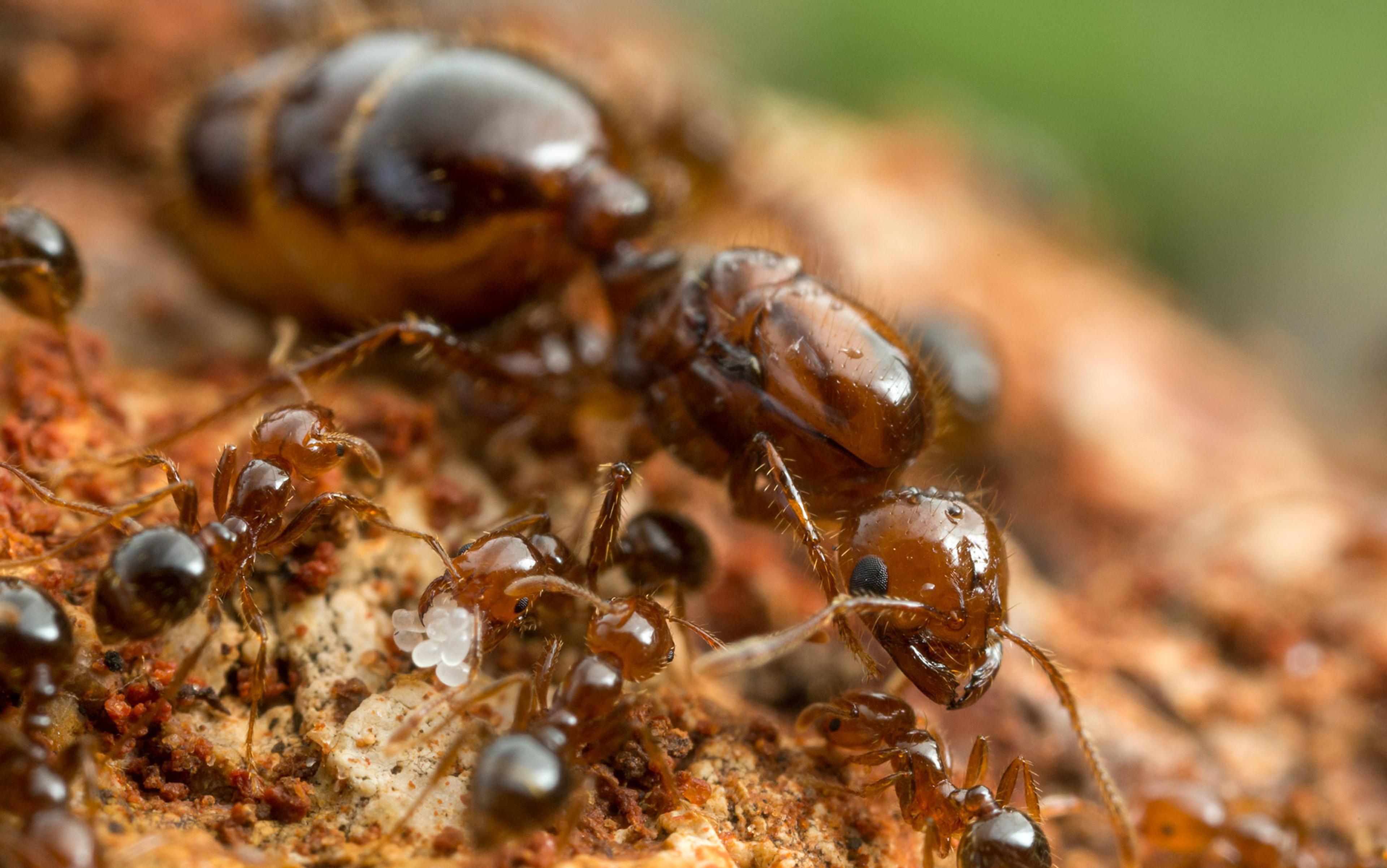
Animals and humans
Ant geopolitics
Over the past four centuries quadrillions of ants have created a strange and turbulent global society that shadows our own
John Whitfield

Artists of our own lives
The genome is the starting point for a performance we enact over a lifetime, not a blueprint we’ve got to follow
Richard O Prum

Ageing and death
Demystifying death – a palliative care specialist’s practical guide to life’s end
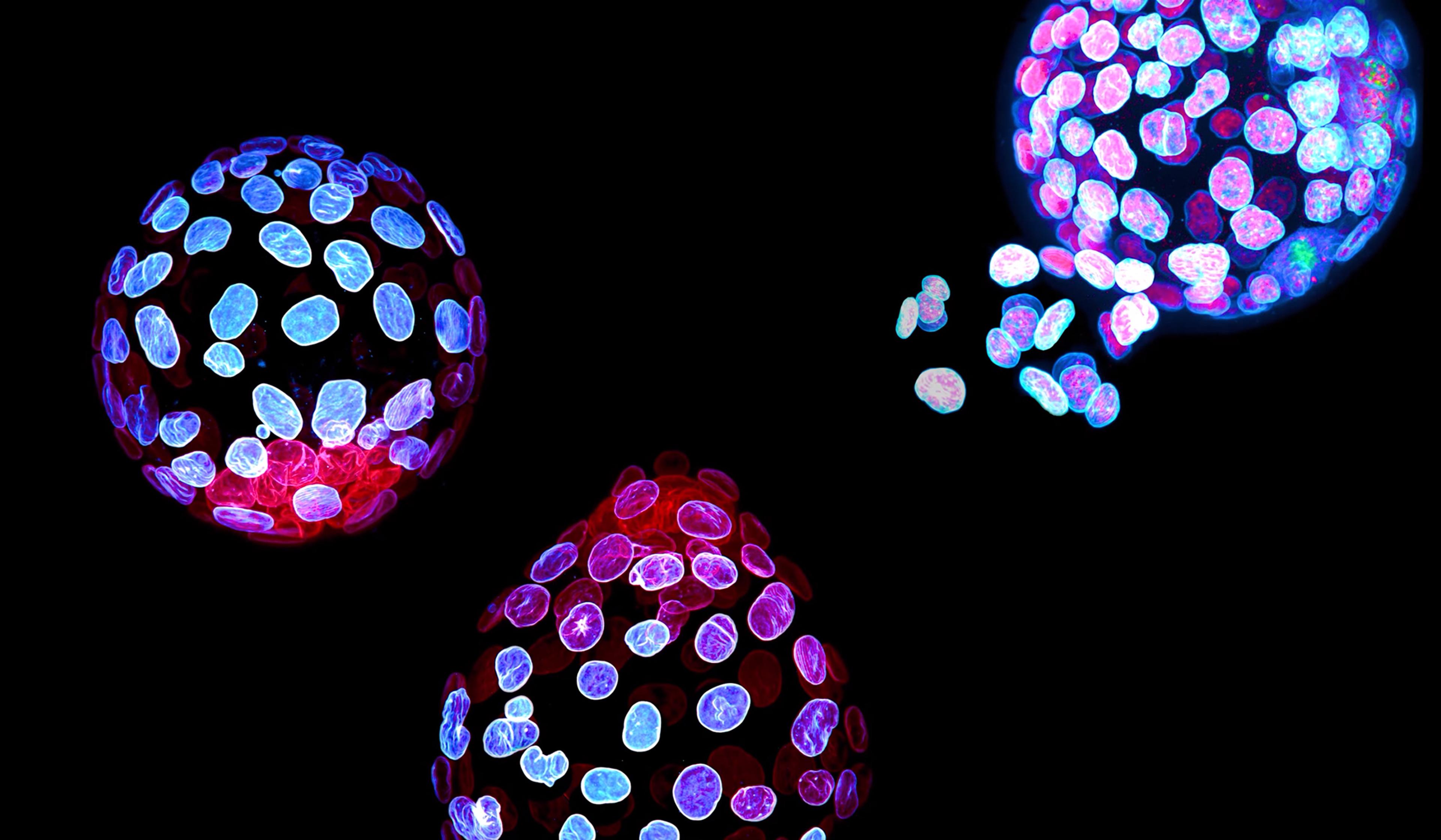
Explore a bioluminescent world of cellular life via cutting-edge microscopy

In 1886, a US agency set out to record new fruit varieties. The results are wondrous
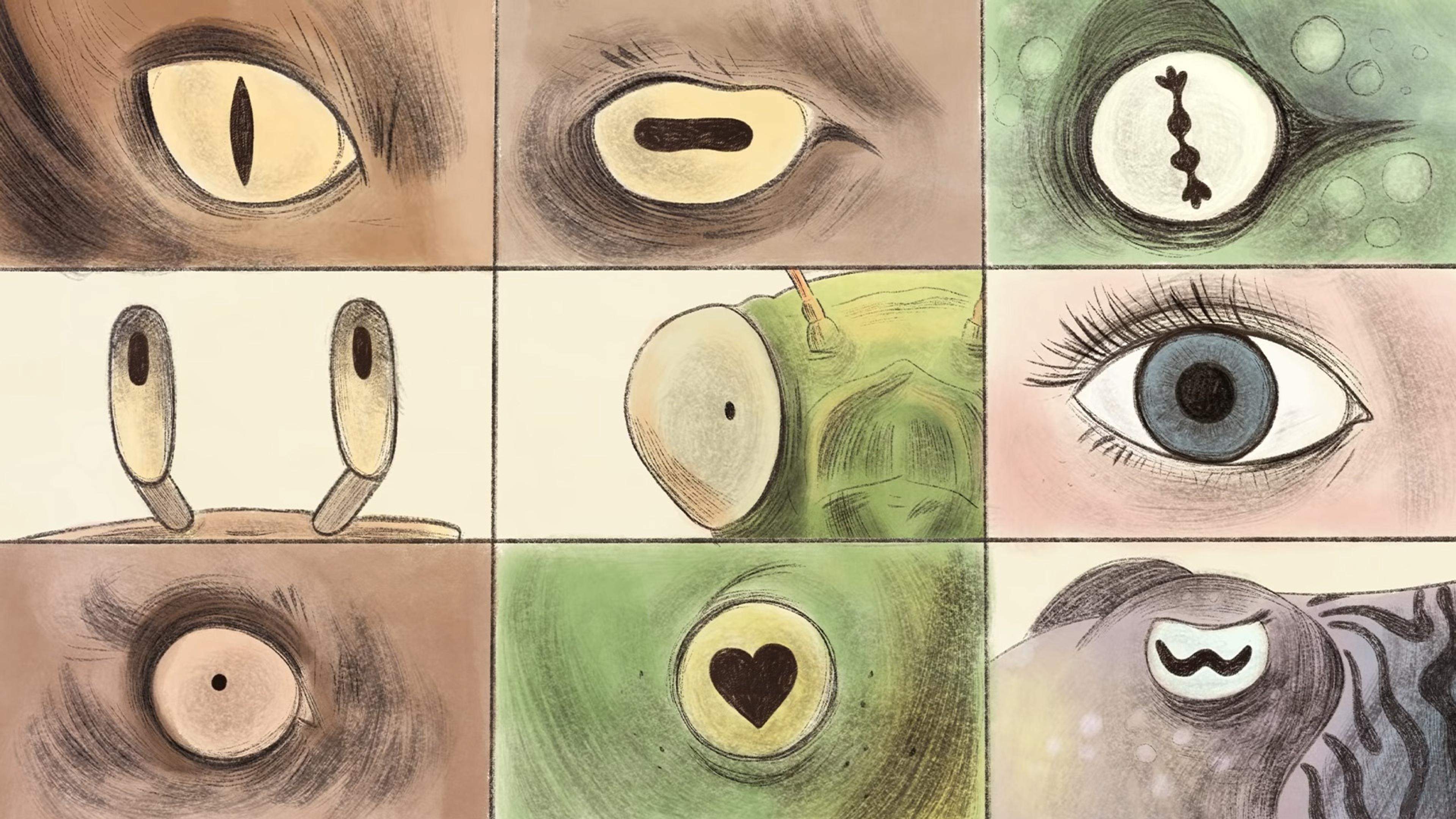
To understand how an animal sees the world, start with the shape of its pupils

Scientists brought a wild horse back from extinction. But is it truly the same animal?

Ecology and environmental sciences
The grassroots project that’s restoring an endangered Hawaiian ecosystem
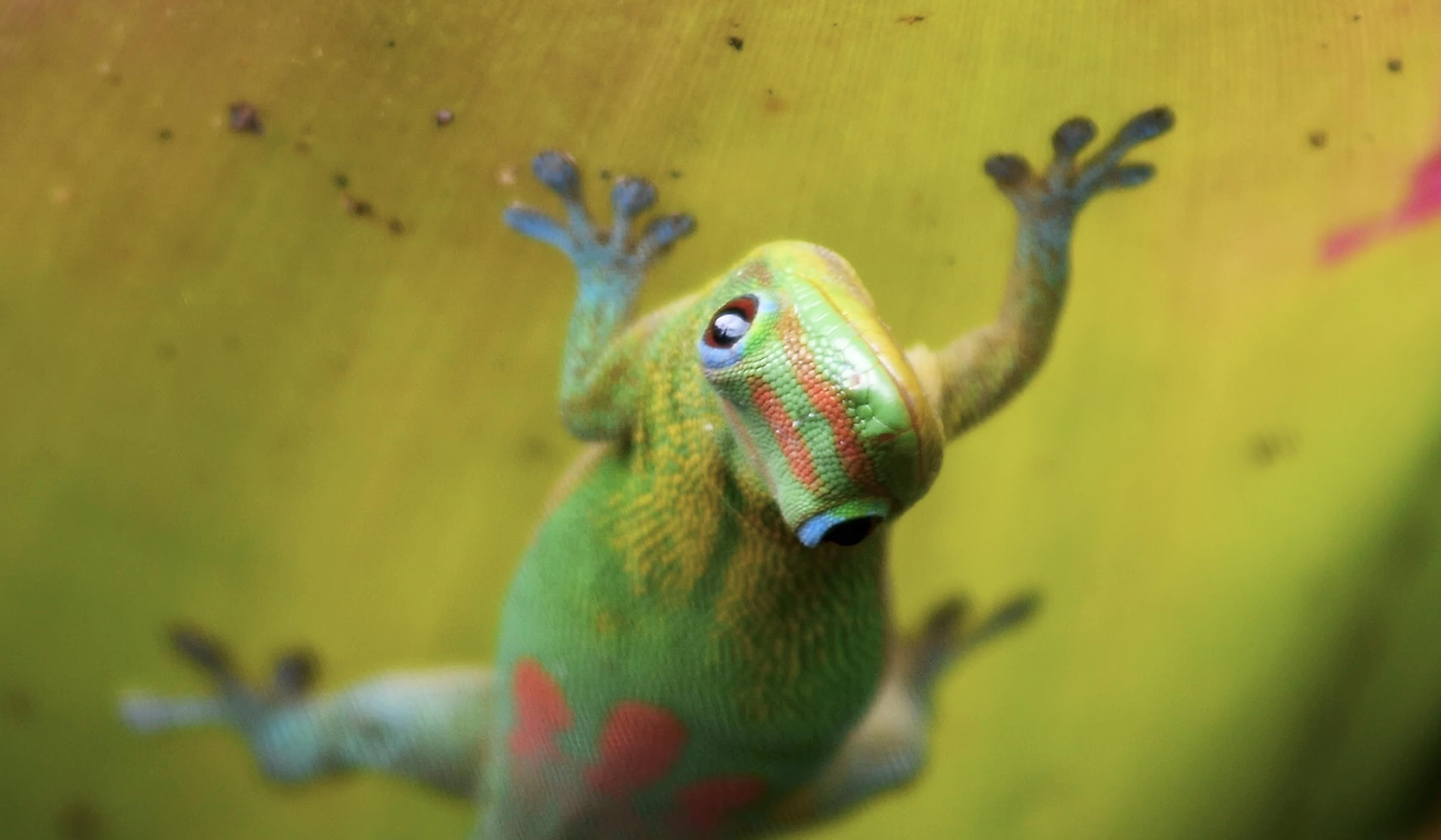
The key to geckos’ unrivalled climbing skills isn’t sticky feet. It’s subatomic

Space exploration
In the search for life, might alien ocean worlds be a better bet than Earth-like planets?

A dazzling slice-by-slice exploration of wood exposes hidden patterns and hues
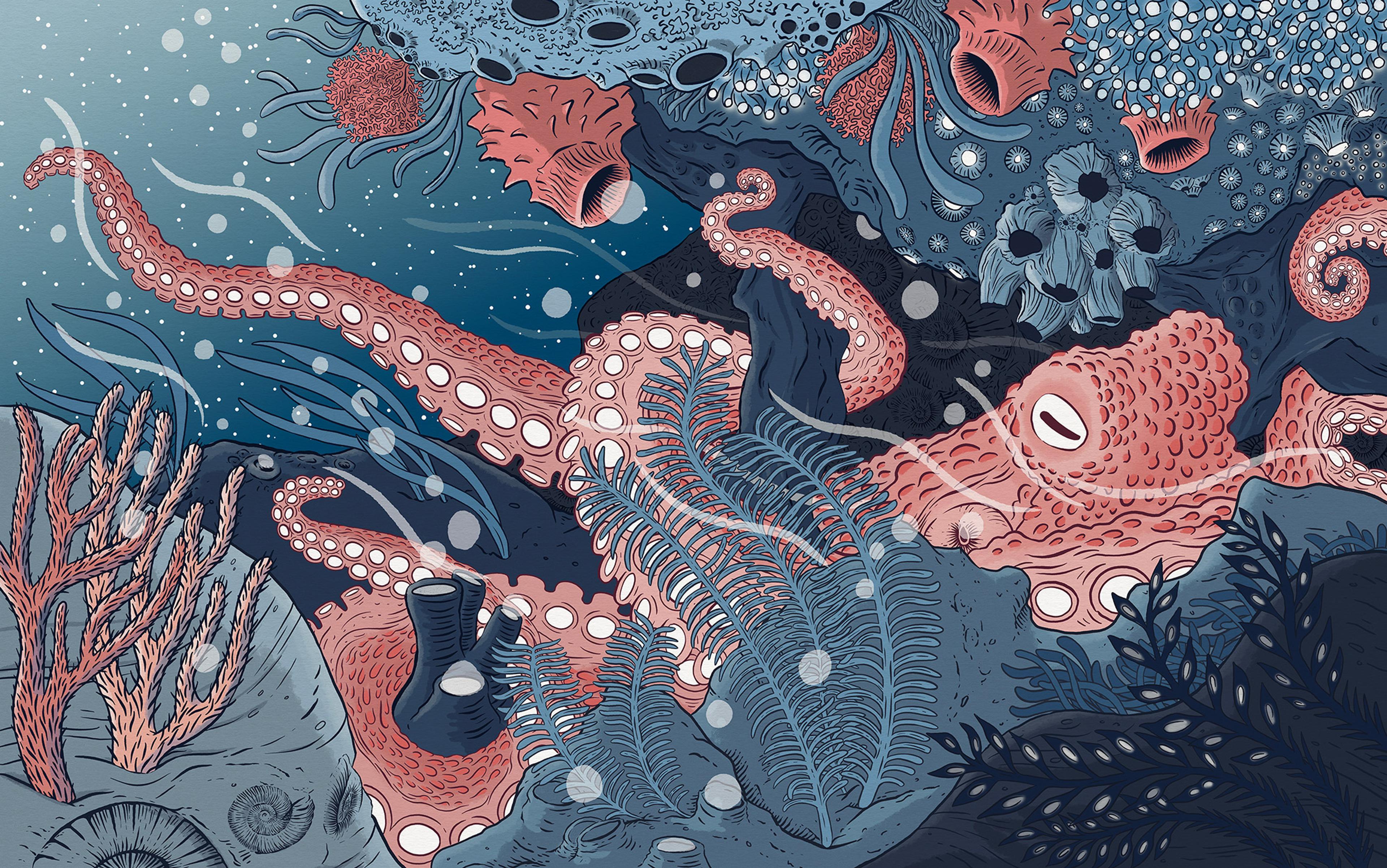
Octopus time
We humans are forward-facing, gravity-bound plodders. Can the liquid motion of the octopus radicalise our ideas about time?
David Borkenhagen

The idea that life on Earth originated elsewhere is not as far out as it seems

Flicker through the eclectic beauty and biological diversity of 2,400 leaves

Biotechnology
What it’s like to wear a prosthetic that ‘feels’
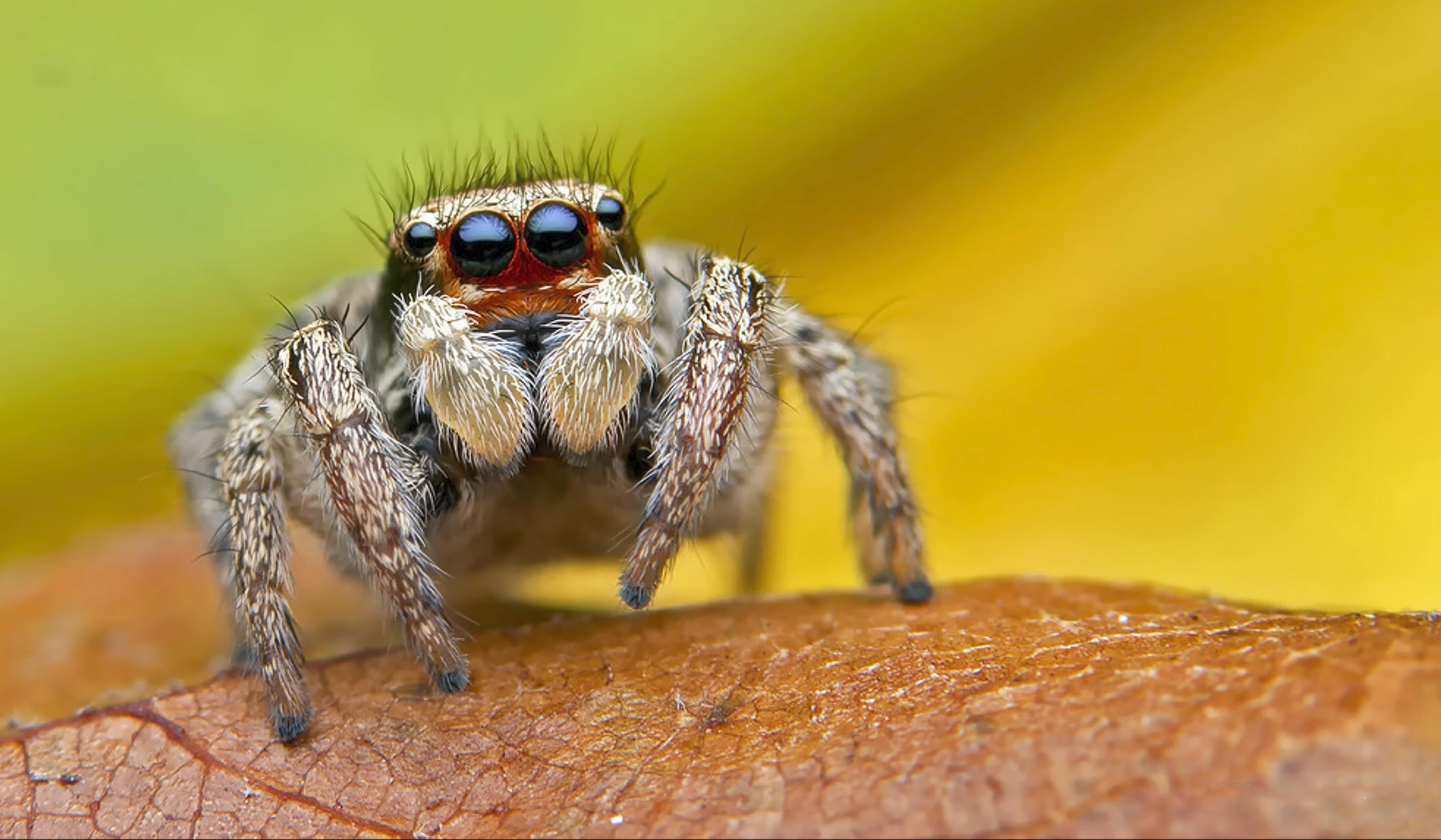
To understand the limits of human senses, look to the wild world of animal cognition
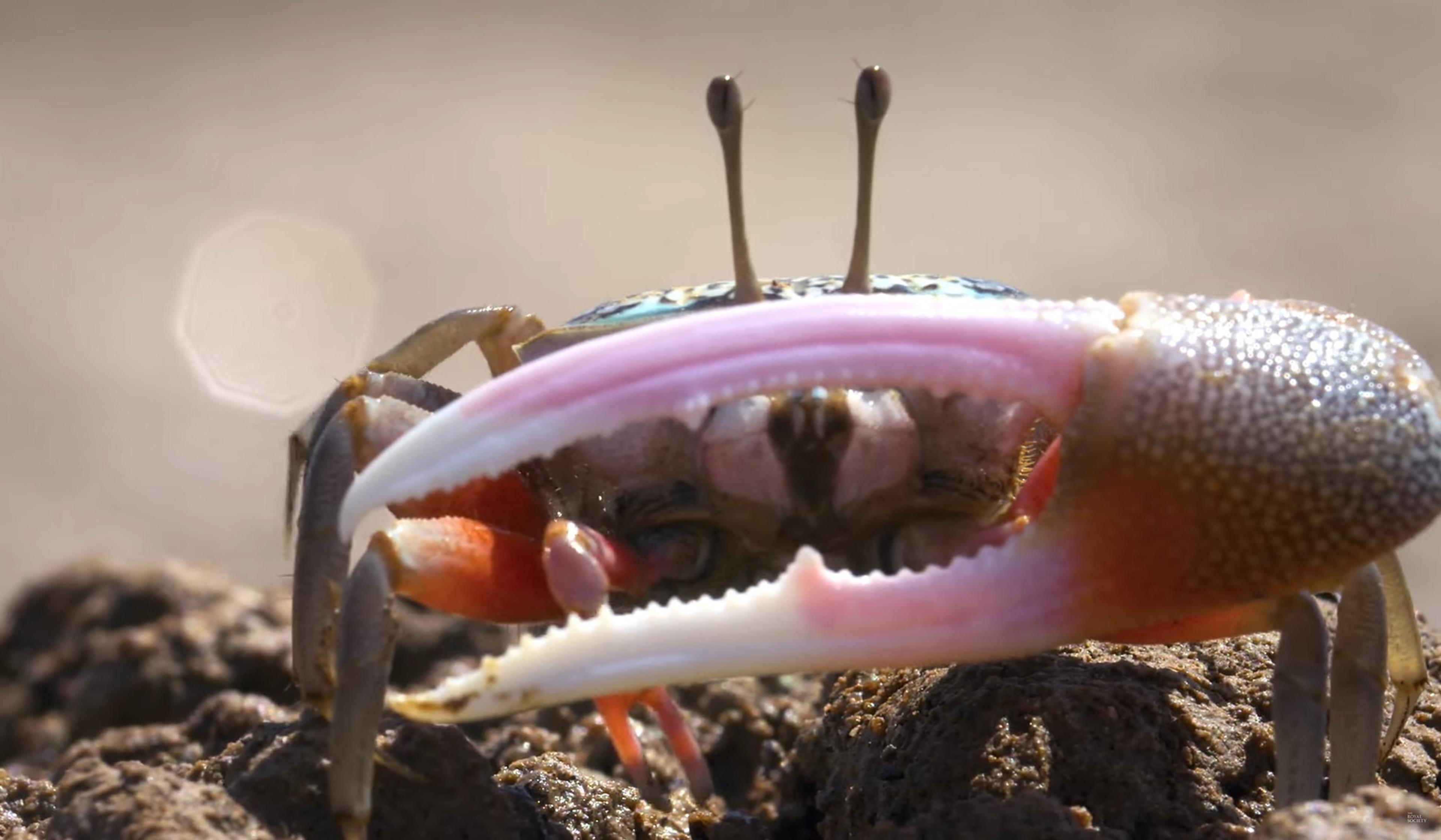
Symmetry rules life on Earth – but it comes with many fascinating exceptions
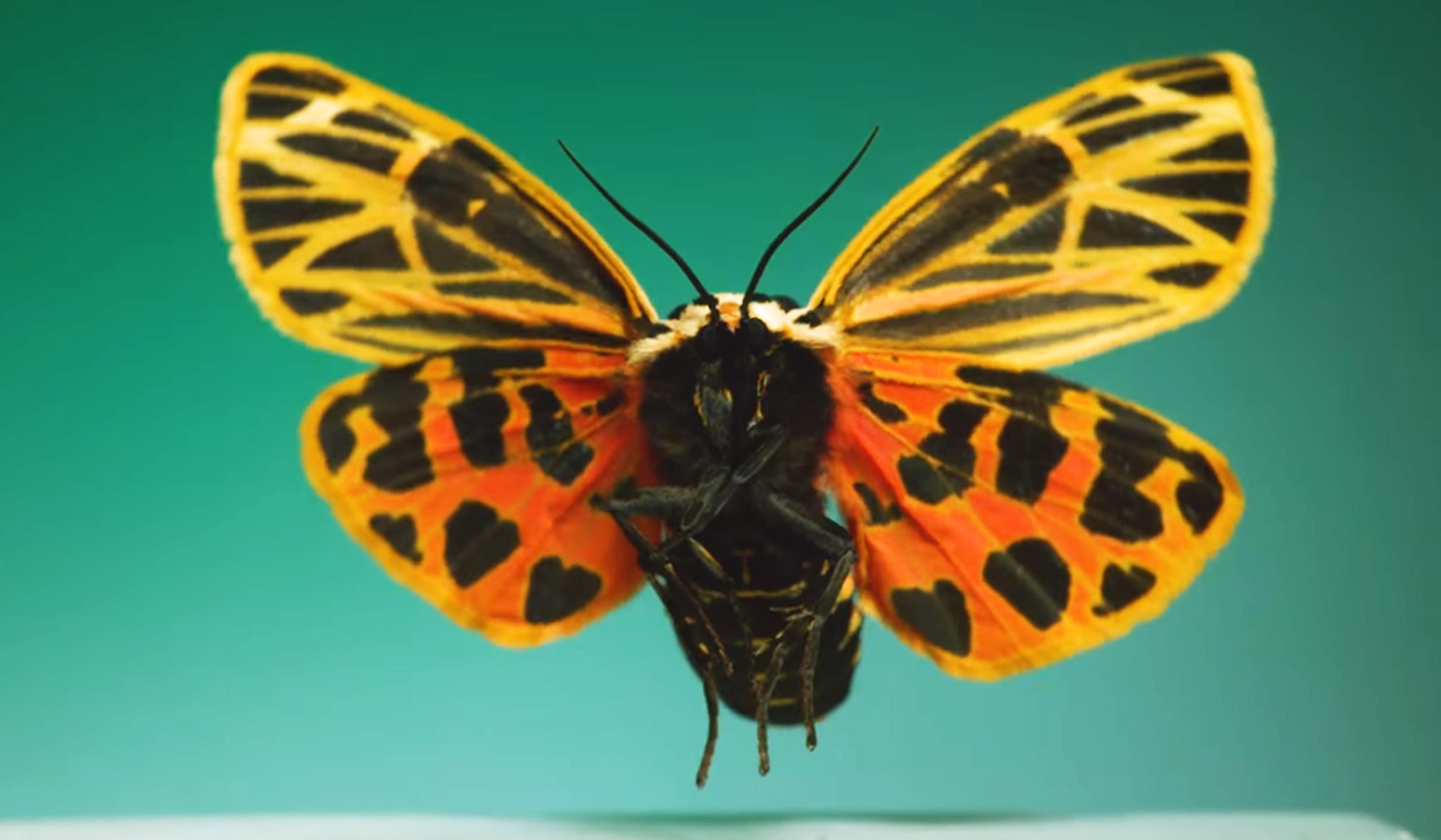
There’s no one way for an insect to fly, but they’re all amazing in close up and slo-mo

Fortune favours the shrewd
Attaining and maintaining power lies at the heart of almost all animal societies. And it’s as devious as human politicking
Lee Alan Dugatkin

Dazzling timelapse shows how microbes spoil our food – and sometimes enrich it

Like pop music, humpback whale songs spread, mutate, and fall out of fashion
University of Notre Dame
Notre Dame Philosophical Reviews
- Home ›
- Reviews ›
Processes of Life: Essays in the Philosophy of Biology

John Dupré, Processes of Life: Essays in the Philosophy of Biology , Oxford University Press, 2012, 320pp., $55.00 (hbk), ISBN 9780199691982.
Reviewed by Robert A. Wilson, University of Alberta
This collection of sixteen essays, all but three of which have been published in the past five years, provides not only a glimpse into the mind of one of the leading philosophers of biology but also a keen sense of some of the new directions that the field has taken over the past decade. Despite the inevitable repetition one encounters across the essays, this will be a useful volume for those in the field to have. Dupré's writing is crisp and engaging, and given his focus on areas of biological science beyond those that have constituted the bread-and-butter of philosophical discussions, the volume should appeal as well to those wondering what all the excitement has been about in recent philosophy of biology.
One of the chief themes of these essays continues Dupré's signature resistance to reductionism in the philosophy of science in general and the philosophy of biology in particular, a resistance first expressed in Dupré's "Natural Kinds and Biological Taxa" (1981) and developed in his The Disorder of Things: Metaphysical Foundations of the Disunity of Science (1993). In Dupré's view, reductionism, unificationism, and monism, as closely related, general philosophical positions, are badly mistaken as views of the nature of science, especially the biological sciences. In their place, Dupré continues to advocate pluralistic views of scientific categories, methodology, and practice with the first essay, "The Miracle of Monism", arguing against monism because of its putative incompatibility with empiricism.
A second thematic thread that runs through the volume stems from Dupré's reflections on specifically biological phenomena and the concepts invoked to capture those phenomena. Chiefly through joint work with Maureen O'Malley that is reprinted here, Dupré sounds the siren loud and clear for the significance of the microbial world for a range of general views that both philosophers and biologists alike have taken for granted. The microbial world has come to occupy more central territory in a range of biological sciences in the past 50 years -- not only in epidemiology and disease-centred sciences and practices, but also in more obviously philosophically salient research on the levels of selection, on the early history of life, and on systematics and phylogeny. Dupré's view is that neglecting the microbial amounts to a damaging and limiting "macrobist" bias in the field. For example, attending to findings about the microbial world and its relation to the macrobial world provides reason to rethink our concept of a biological individual, and to view post-genetic research programs, such as metagenomics, with some enthusiasm. Dupré's Spinoza Lectures at the University of Amsterdam, "The Constituents of Life", reprinted as chapters 4 and 5, contain perhaps his clearest arguments for pluralism that appeal to the microbial world.
Dupré not only critiques some received views in the field but also offers more positive suggestions about how to think about life, organisms, and the organization of the biological world more generally. Two ideas pervade Dupré's more constructive thinking about key concepts and views about the biological world: the idea that living things in general and organisms in particular are processes, not entities, and the position that he calls promiscuous individualism.
To unpack this tantalizing coinage and to get some sense of how the microbial world is significant for such constructive views, consider symbiosis, the tight, mutually beneficial interdependence between two living things (typically organisms) that is typified by lichens, which are composite organisms made up of a fungus and either a cyanobacterium or some other photosynthesizing organism, such as green algae. Here is what Dupré says about symbiosis in describing the content of one of the essays in the volume:
Here I make for the first time the argument that the omnipresence of symbiosis should be seen as undermining the project of dividing living systems unequivocally into unique organisms, a conclusion I refer to in later chapters as 'promiscuous individualism', in parallel with my doctrine of promiscuous realism about species. (p.8; cf. p.241)
In this case, the appeal is to the putative pervasiveness of a given phenomenon (symbiosis) as the grounds for endorsing pluralism about organisms. Applying Dupré's well-known promiscuous realism here, we have not only the epistemic view that there are many legitimate ways to classify the world into biological individuals, including organisms, but the corresponding ontological view that such legitimation is provided by there being multiple biological individuals there to classify.
One sensible consequence of this view is that there is, at least often enough, no unique answer to the questions, asked of a particular biological situation, "How many biological individuals/organisms are there here?". As Dupré says, "what an organism is, and whether something is part of an organism or not, are not questions that necessarily admit of definitive answers" (p.153). But one should not under-estimate how ontologically radical promiscuous individualism is, and might even wonder whether the implied "not necessarily" here should be the stronger "necessarily do not".
For example, in the case of lichens, in challenging the view that there is just one organism (the lichen) or two organisms (the fungus and the cyanobacterium), an advocate of promiscuous individualism can readily make the case that there are three organisms (the lichen, the fungus, and the cyanobacterium), pointing to the different purposes and goals one might have in opting for either of the more monistic counts of organism numbers here. But given that it is a population of millions of cyanobacteria inhabiting any given fungus that jointly compose a lichen, and that there are multiple ways to draw the boundary between individual fungi of a given species, promiscuity runs rampant here. Dupré himself holds that populations of organisms, including multispecies populations, such as those found in microbial biofilms, can themselves be both biological individuals and organisms (pp.89, 175-176, 194, 203), and that "Whether a group of microbes is a closely connected ecological community or an organism may be a matter of biological judgment" (p.153). Promiscuous individualism thus seems to imply that there are many, many different numbers of individuals present in this paradigm case.
In the preceding paragraph I have shifted between talk of biological individuals and of organisms, and Dupré is clear (e.g., p.207) that the former cannot simply be equated with the latter (see also Wilson and Barker 2012). But what of these and kindred concepts -- biological individual, organism, living thing, life -- themselves? Like pluralism about species, an interesting pluralism about these biological phenomena needs to be more than some kind of disjunctivism about the corresponding concept. In "Varieties of Living Things" (chapter 12), written with O'Malley, Dupré advocates a more complete survey of the putative kinds of living things there are than philosophers of biology are usually content with, calling attention to prions, plasmids, and organelles in addition to more familiar, large, multicellular life forms. Of living things themselves, O'Malley and Dupré say that "matter is living when lineages are involved -- directly or indirectly -- in metabolism" (p.206), and view collaboration as a more central feature of living things than it is often acknowledged as being.
But O'Malley and Dupré are less clear both about how to move beyond these imprecise characterizations of living things and about the relationship between these interesting claims and promiscuous individualism, or how we should think about the various other putative criteria for life, such as reproduction, spatial boundedness, and evolvability. For example, while they rightly point to problems in identifying the exact physical boundaries for individual biological entities as a reason to question whether that criterion is strictly necessary, they appear to take the ability to reproduce to be a necessary condition for being a living thing (pp.208, 224), despite the fact that many organisms do not (and cannot) themselves reproduce. In addition, reproduction and metabolism, as central as they are to their view of living things, remain largely unexplained, despite the attention they have received in the work of others, such as James Griesemer and Peter Godfrey-Smith.
While I sympathize with Dupré's view that organisms are not the only biological entities of significance, the inferences one can draw from this point remain unclear. Consider "Metagenomics and Biological Ontology" (chapter 11), where Dupré and O'Malley argue that the metagenome, the set of genomic resources in a given environment, is a communal resource
and that the entity to which the resource is available is a coordinated, developing, multifunctional, multicellular organism composed of large numbers of cells of different varieties and capabilities, able to work in ways in which the collectivity regulates the functions of individuals (p.200).
Even in the space of this short sentence, a number of questions arise. First, why should we think that there is such a single entity at all, especially if we are proponents of promiscuous individualism? Second, what is the concept of an organism that would support the view that this entity is an organism? (For a pluralist, the same question could be asked of the various entities that make use of this communal resource.) Dupré and O'Malley later talk of biofilms as "organism-like communities" (p.203), and may not strictly endorse the biological ontology of metaorganisms that they at least seriously entertain. Yet this does not obviate but instead highlights the need for some more sustained, positive discussion of what organisms are. One issue is whether Dupré's pluralism implies that the question of whether metagenomics entails the existence of metaorganisms is misplaced.
Regarding organisms themselves, Dupré is clear enough about what they are not: they are not to be identified monogenomically, or as the sole kind of living thing, or as the only or even primary unit of selection. But what are organisms, on Dupré's view, and how are they distinguished from other biological individuals? Dupré identifies organisms as dynamic entities, as processes (not things), as life cycles, as collaboratively oriented, and as determined by the communities they form a part of as well as by what they are constituted by. When he says that "functioning biological individuals are typically symbiotic wholes involving many organisms of radically different kinds" (p.9), Dupré is clearly identifying something significant about both organisms and biological individuals more generally, much as he does when he identifies living things as existing at the intersection of metabolism and lineage. But he is reluctant, perhaps consistently so given his promiscuous individualism, to embrace the idea that there is a single criterion, or set of criteria, that the concept of an organism answers to. The tension that exists between this reluctance and the defence of particular claims about organisms (e.g., that there are metaorganisms) raises the question of whether a promiscuous individualist like Dupré owes us something more informative about what organisms are.
Similar questions might be asked about a range of other issues that Dupré discusses: whether viruses are living things (e.g., p.91), whether a gene really is "any bit of DNA that anyone has reason to name and keep track of" (p.112), and whether, referencing reductionism, genomics is best thought of as "the successor science to genetics that rejects this obsolete epistemology and methodology" (p.115). Dupré's discussion of all three of these issues can come across as flippant at times, in the last case raising some questions about another thread that runs through this volume, one concerning the social locatedness of the biological sciences.
Dupré knows the effects that misdirected biology has had with respect to race and gender, and apart from an essay dedicated to the former (chapter 15, "What Genes Are, and Why There are No 'Genes for Race'"), the volume also contains papers on the concept of disease and evolutionary psychology, the latter of these extending Dupré's critique from his Human Nature and the Limits of Science (2002). In fact, sensitivity to the social context in which both theory and practice in the biological sciences develop is manifest throughout much of the volume. This can make Dupré's enthusiasm for metagenomics seem strangely glib, especially given Dupré's anti-reductionism and that metagenomics itself might be seen as extending the reach of reductive research programs focused on those small agents of life, genes. More explicit reflection by Dupré on the social context not only of metagenomics but of the other theoretical directions in biology that these essays direct us to, such as developmental systems theory and epigenetics, would be a welcome complement to Processes of Life .
Dupré, J., 1981, "Natural Kinds and Biological Taxa", Philosophical Review , 90: 66-90.
Dupré, J., 1993, The Disorder of Things: Metaphysical Foundations of the Disunity of Science . New York: Oxford University Press.
Dupré, J., 2002, Human Nature and the Limits of Science . New York: Oxford University Press.
Wilson, Robert A., and M.J. Barker, 2012, "The Biological Notion of Individual", Stanford Encyclopedia of Philosophy , revised version in press.
- International
- Schools directory
- Resources Jobs Schools directory News Search

A level biology essay on diffusion
Subject: Biology
Age range: 16+
Resource type: Assessment and revision
Last updated
- Share through email
- Share through twitter
- Share through linkedin
- Share through facebook
- Share through pinterest

This document includes a model essay on the topic of diffusion. Since the A-level biology essay accounts for ten percent of your final grade, it is imperative that you optimize your score by maximizing the number of marks you receive. This essay has been meticulously crafted for A-level students and serves as a model essay that achieved an exceptional score of twenty-two out of twenty-five. It is our sincere hope that you will draw inspiration from this essay by examining its structure and content, thereby propelling your academic performance to new heights.
Tes paid licence How can I reuse this?
Your rating is required to reflect your happiness.
It's good to leave some feedback.
Something went wrong, please try again later.
This resource hasn't been reviewed yet
To ensure quality for our reviews, only customers who have purchased this resource can review it
Report this resource to let us know if it violates our terms and conditions. Our customer service team will review your report and will be in touch.
Not quite what you were looking for? Search by keyword to find the right resource:
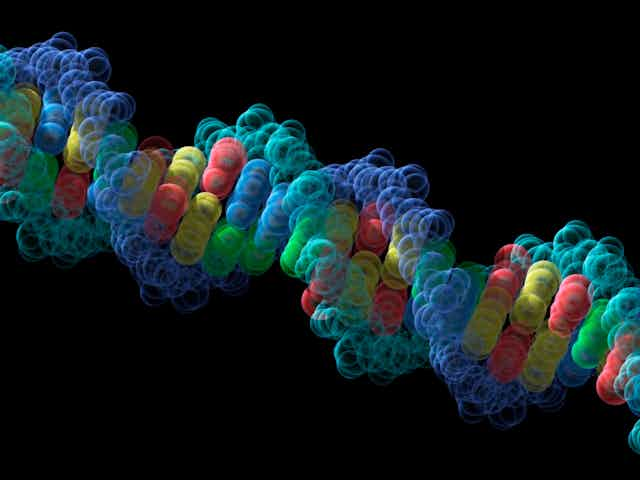
Quantum physics proposes a new way to study biology – and the results could revolutionize our understanding of how life works
Quantum Biology Tech (QuBiT) Lab, Assistant Professor of Electrical and Computer Engineering, University of California, Los Angeles
Disclosure statement
Clarice D. Aiello receives funding from NSF, ONR, IDOR Foundation, Faggin Foundation, Templeton Foundation.
University of California, Los Angeles provides funding as a member of The Conversation US.
View all partners
Imagine using your cellphone to control the activity of your own cells to treat injuries and disease. It sounds like something from the imagination of an overly optimistic science fiction writer. But this may one day be a possibility through the emerging field of quantum biology.
Over the past few decades, scientists have made incredible progress in understanding and manipulating biological systems at increasingly small scales, from protein folding to genetic engineering . And yet, the extent to which quantum effects influence living systems remains barely understood.
Quantum effects are phenomena that occur between atoms and molecules that can’t be explained by classical physics. It has been known for more than a century that the rules of classical mechanics, like Newton’s laws of motion, break down at atomic scales . Instead, tiny objects behave according to a different set of laws known as quantum mechanics .
For humans, who can only perceive the macroscopic world, or what’s visible to the naked eye, quantum mechanics can seem counterintuitive and somewhat magical. Things you might not expect happen in the quantum world, like electrons “tunneling” through tiny energy barriers and appearing on the other side unscathed, or being in two different places at the same time in a phenomenon called superposition .
I am trained as a quantum engineer . Research in quantum mechanics is usually geared toward technology. However, and somewhat surprisingly, there is increasing evidence that nature – an engineer with billions of years of practice – has learned how to use quantum mechanics to function optimally . If this is indeed true, it means that our understanding of biology is radically incomplete. It also means that we could possibly control physiological processes by using the quantum properties of biological matter.
Quantumness in biology is probably real
Researchers can manipulate quantum phenomena to build better technology. In fact, you already live in a quantum-powered world : from laser pointers to GPS, magnetic resonance imaging and the transistors in your computer – all these technologies rely on quantum effects.
In general, quantum effects only manifest at very small length and mass scales, or when temperatures approach absolute zero. This is because quantum objects like atoms and molecules lose their “quantumness” when they uncontrollably interact with each other and their environment. In other words, a macroscopic collection of quantum objects is better described by the laws of classical mechanics. Everything that starts quantum dies classical. For example, an electron can be manipulated to be in two places at the same time, but it will end up in only one place after a short while – exactly what would be expected classically.
In a complicated, noisy biological system, it is thus expected that most quantum effects will rapidly disappear, washed out in what the physicist Erwin Schrödinger called the “ warm, wet environment of the cell .” To most physicists, the fact that the living world operates at elevated temperatures and in complex environments implies that biology can be adequately and fully described by classical physics: no funky barrier crossing, no being in multiple locations simultaneously.
Chemists, however, have for a long time begged to differ. Research on basic chemical reactions at room temperature unambiguously shows that processes occurring within biomolecules like proteins and genetic material are the result of quantum effects. Importantly, such nanoscopic, short-lived quantum effects are consistent with driving some macroscopic physiological processes that biologists have measured in living cells and organisms. Research suggests that quantum effects influence biological functions, including regulating enzyme activity , sensing magnetic fields , cell metabolism and electron transport in biomolecules .
How to study quantum biology
The tantalizing possibility that subtle quantum effects can tweak biological processes presents both an exciting frontier and a challenge to scientists. Studying quantum mechanical effects in biology requires tools that can measure the short time scales, small length scales and subtle differences in quantum states that give rise to physiological changes – all integrated within a traditional wet lab environment.
In my work , I build instruments to study and control the quantum properties of small things like electrons. In the same way that electrons have mass and charge, they also have a quantum property called spin . Spin defines how the electrons interact with a magnetic field, in the same way that charge defines how electrons interact with an electric field. The quantum experiments I have been building since graduate school , and now in my own lab, aim to apply tailored magnetic fields to change the spins of particular electrons.
Research has demonstrated that many physiological processes are influenced by weak magnetic fields. These processes include stem cell development and maturation , cell proliferation rates , genetic material repair and countless others . These physiological responses to magnetic fields are consistent with chemical reactions that depend on the spin of particular electrons within molecules. Applying a weak magnetic field to change electron spins can thus effectively control a chemical reaction’s final products, with important physiological consequences.
Currently, a lack of understanding of how such processes work at the nanoscale level prevents researchers from determining exactly what strength and frequency of magnetic fields cause specific chemical reactions in cells. Current cellphone, wearable and miniaturization technologies are already sufficient to produce tailored, weak magnetic fields that change physiology , both for good and for bad. The missing piece of the puzzle is, hence, a “deterministic codebook” of how to map quantum causes to physiological outcomes.
In the future, fine-tuning nature’s quantum properties could enable researchers to develop therapeutic devices that are noninvasive, remotely controlled and accessible with a mobile phone. Electromagnetic treatments could potentially be used to prevent and treat disease, such as brain tumors , as well as in biomanufacturing, such as increasing lab-grown meat production .
A whole new way of doing science
Quantum biology is one of the most interdisciplinary fields to ever emerge. How do you build community and train scientists to work in this area?
Since the pandemic, my lab at the University of California, Los Angeles and the University of Surrey’s Quantum Biology Doctoral Training Centre have organized Big Quantum Biology meetings to provide an informal weekly forum for researchers to meet and share their expertise in fields like mainstream quantum physics, biophysics, medicine, chemistry and biology.
Research with potentially transformative implications for biology, medicine and the physical sciences will require working within an equally transformative model of collaboration. Working in one unified lab would allow scientists from disciplines that take very different approaches to research to conduct experiments that meet the breadth of quantum biology from the quantum to the molecular, the cellular and the organismal.
The existence of quantum biology as a discipline implies that traditional understanding of life processes is incomplete. Further research will lead to new insights into the age-old question of what life is, how it can be controlled and how to learn with nature to build better quantum technologies.
- Quantum mechanics
- Quantum physics
- Electromagnetic radiation
- Magnetic fields
- atomic scale
- Quantum technologies
- Subatomic particles
- Interdisciplinary research
- Quantum science
- Quantum superposition
- Electromagnetic energy
- Quantum technology
- Magnetic field
- Science collaboration
- Interdisciplinary science

Compliance Lead

Lecturer / Senior Lecturer - Marketing

Assistant Editor - 1 year cadetship

Executive Dean, Faculty of Health

Lecturer/Senior Lecturer, Earth System Science (School of Science)
share this!
May 17, 2024
This article has been reviewed according to Science X's editorial process and policies . Editors have highlighted the following attributes while ensuring the content's credibility:
fact-checked
trusted source
A new 'rule of biology' may have come to light, expanding insight into evolution and aging
by Darrin S. Joy, University of Southern California

A molecular biologist at the USC Dornsife College of Letters, Arts and Sciences may have found a new "rule of biology."
A rule of biology, sometimes called a biological law, describes a recognized pattern or truism among living organisms. Allen's rule, for example, states that among warm-blooded animals, those found in colder areas have shorter, thicker limbs (to conserve body heat ) than those in hotter regions, which need more body surface area to dissipate heat.
Zoologist Joel Allen formulated this idea in 1877, and though he wasn't the first or the last to present a rule of biology, his is one of just a handful to gain acceptance among scientists.
Now, John Tower, professor of biological sciences at USC Dornsife, believes he has uncovered another rule of biology. He published his idea on May 16 in the journal Frontiers in Aging .
Life may require instability
Tower's rule challenges long-held notions that most living organisms prefer stability over instability because stability requires less energy and fewer resources. For instance, hexagons appear frequently in nature—think honeycombs and insect eyes—because they are stable and require the least amount of material to cover a surface.
Tower centers his rule on instability, specifically a concept called "selectively advantageous instability," or SAI, in which some volatility in biological components, such as proteins and genetic material , provides an advantage to cells.
Tower believes SAI is a fundamental part of biology. "Even the simplest cells contain proteases and nucleases and regularly degrade and replace their proteins and RNAs, indicating that SAI is essential for life," he explains.
He says SAI also plays a key role in evolution.
As cells go about their business, building and degrading various unstable components, he explains, they will exist in one of two states—one state with an unstable component present and one state in which the unstable component is absent.
Natural selection may act differently on the two cell states. "This can favor the maintenance of both a normal gene and a gene mutation in the same cell population, if the normal gene is favorable in one cell state and the gene mutation is favorable in the other cell state," he says. Allowing this genetic diversity can make cells and organisms more adaptable.
SAI may be at the root of aging—and more
Selectively advantageous instability may also contribute to aging. Creating and then replacing the unstable components within cells comes at the cost of materials and energy. Breaking it down may also require additional energy.
Also, since SAI sets up two potential states for a cell, allowing normal and mutated genes to co-exist, if the mutated gene is harmful, this may contribute to aging, Tower says.
In addition to evolution and aging, SAI has other far-reaching implications.
"Science has been fascinated lately with concepts such as chaos theory , criticality, Turing patterns and ' cellular consciousness ,' says Tower. "Research in the field suggests that SAI plays an important role in producing each of these phenomena."
Because of its apparent ubiquity in biology and its far-reaching implications, SAI may be the newest rule of biology , he says.
Provided by University of Southern California
Explore further
Feedback to editors

Blue Origin flies thrill seekers to space after two year hiatus
4 hours ago

Composition of gut microbiota could influence decision-making
May 18, 2024

Researchers realize multiphoton electron emission with non-classical light

Saturday Citations: Mediterranean diet racks up more points; persistent quantum coherence; vegan dogs

Physicists propose path to faster, more flexible robots

Scientists develop new geochemical 'fingerprint' to trace contaminants in fertilizer

Study reveals how a sugar-sensing protein acts as a 'machine' to switch plant growth—and oil production—on and off

Researchers develop world's smallest quantum light detector on a silicon chip

How heat waves are affecting Arctic phytoplankton

Horse remains show Pagan-Christian trade networks supplied horses from overseas for the last horse sacrifices in Europe
Relevant physicsforums posts, dna-maternity test - could you see other relationship than mother.
23 hours ago
And Now, here comes COVID-19 version BA.2, BA.4, BA.5,...
Is it usual for vaccine injection site to hurt again during infection.
May 16, 2024
A Brief Biography of Dr Virgina Apgar, creator of the baby APGAR test
May 12, 2024
Who chooses official designations for individual dolphins, such as FB15, F153, F286?
May 9, 2024
The Cass Report (UK)
May 1, 2024
More from Biology and Medical
Related Stories

At the molecular level, aging is not always a matter of 'pay later'
Sep 12, 2018

RNA that doesn't age: Neuroscientists discover building blocks in nerve cells that last a life time
Apr 8, 2024

Scientists find that senescence can accelerate evolution
Dec 11, 2023

Study sheds light on rare genetic disorder and blood cancers
Oct 12, 2023

Scientists slow aging by engineering longevity in cells
Apr 27, 2023

Key genes linked to DNA damage and human disease uncovered
Feb 14, 2024
Recommended for you

Study indicates Earth's earliest sea creatures drove evolution by stirring the water

New research shows the true cost of reproduction across the animal kingdom

Researchers in Portugal develop an image analysis AI platform to boost worldwide research

Researchers use machine-learning modeling tools to improve zinc-finger nuclease editing technology
Let us know if there is a problem with our content.
Use this form if you have come across a typo, inaccuracy or would like to send an edit request for the content on this page. For general inquiries, please use our contact form . For general feedback, use the public comments section below (please adhere to guidelines ).
Please select the most appropriate category to facilitate processing of your request
Thank you for taking time to provide your feedback to the editors.
Your feedback is important to us. However, we do not guarantee individual replies due to the high volume of messages.
E-mail the story
Your email address is used only to let the recipient know who sent the email. Neither your address nor the recipient's address will be used for any other purpose. The information you enter will appear in your e-mail message and is not retained by Phys.org in any form.
Newsletter sign up
Get weekly and/or daily updates delivered to your inbox. You can unsubscribe at any time and we'll never share your details to third parties.
More information Privacy policy
Donate and enjoy an ad-free experience
We keep our content available to everyone. Consider supporting Science X's mission by getting a premium account.
E-mail newsletter

IMAGES
VIDEO
COMMENTS
KCSE BIOLOGY BIOLOGY ESSAY QUESTIONS WITH MARK SCHEMES 1. Explain the various ways in which a typical cell is adapted to its functions Has a cell membrane; with pores; that regulates substances entering and leaving the cell; cytoplasm; contain sugars and salts; for maintaining its osmotic pressure; also has a liquid
A biology essay is a type of academic paper that focuses on a particular topic of biology. It can discuss animal life, cycles in biology, or a botanic subject. You will need to demonstrate your critical thinking skills and provide relevant evidence to support your perspective. On this page, you will find examples of biology essays.
Writing essays about biology can be difficult because it's composed of many subtopics. Check out this article for our top essay examples and writing prompts. Biology came from the Greek words "bios" (life) and "logos" (study). It's why biology is the study of life or living organisms. Aside from being a natural science, it also has ...
186 essay samples found. Biology is the study of living organisms and their interactions with one another and their environments. Essays could explore significant discoveries in biology, discuss the ethical implications of biological research, or delve into the interdisciplinary aspects of biology in addressing complex environmental and health ...
By understand-ing how evolution helped shape our psychology, individuals and societ-ies might make better decisions about how to respond to the challenges and choices we face today. 2. EVOLUTION IN HEALTH AND DISEASE. Diseases are usually studied with a focus on proximate causes.
A biology essay is a piece of student writing where you provide arguments and ideas concerning a particular biological topic. There are various academic essay types, and you can adhere to one of them. For example, you can write a descriptive paper explaining a biological subject. Or an argumentative paper, providing evidence to support your ...
A Level Biology is a challenging but rewarding course that covers a wide range of topics, from DNA and genetic inheritance to ecosystems and biodiversity. The key to success in this subject lies in understanding and applying the core principles of Biology and expressing your understanding in well-structured, coherent essays.
Create an Outline. Always have a clear plan when writing biology essays while starting a paper. Use a 5-paragraph structure with an outline to keep your main idea and arguments organized. Use any format that works best for you and adjust as needed. Discard any ideas that don't fit your research question.
Current Biology's Essays comprise an eclectic collection of pieces that discuss a wide range of concepts, ideas and phenomena ... maize and soybeans — provide more than 60% of the calories we consume. In this Essay, Delphine Renard and David Tilman discuss the risks of monoculture and how the biodiversification of agriculture may lead to ...
Biology and Social Construction Involved in Training Children It has been quite a continuing debate over the years upon whether biology and genetics play a more important role in the upbringing of children and adaptation of roles or whether social construction and nurture overrides the innate nature. As soon as the child is born and opens his or her eyes into the world, there is a need to ...
Publishing in Biology: Follow the Directions. In terms of writing style, papers in biology must meet agreed upon standards for organization, clarity, coherency and consistency in form (i.e., voice, tense, notation, citation, figures, etc.). In traditional outlets for sharing results (peer-reviewed journals), biologists do not get paid for ...
Our aim in setting an essay as part of your assessment is for you to learn. 1. to obtain information from the scientific literature, 2. to synthesize information from diverse sources, 3. to use it to critically evaluate and discuss arguments or ideas, and 4. then to communicate these to the reader. Most scientific communication is by means of ...
Because of this, microbiology is strongly linked with immunology. Anatomy. Anatomical research focuses on the structure of tissues and organs. Cell and molecular biology. Cells are the basis for every living being. The key topic in this area is the molecular organization of cells. Environmental biology.
Essays on Biology . Essay examples. Essay topics. Topics in this category. 1 Comparing and Contrasting Mitosis and Meiosis . 1 page / 538 words . Both mitosis and meiosis are processes that are essential for the reproduction and growth of living organisms. While they share some similarities, they also have distinct differences that make them ...
the essay in BIOL5 - this proved to be the case. • This year, the mean mark for the essay was 14.1 and the SD 5.0 - both slightly higher than for 2016 BIOL5. • The discrimination index was 0.52 - equal highest on the paper and (historically) high for any question on a Biology paper - this means that
The essay itself is a long one—although there's a cap of 4,000 words, most successful essays get very close to this limit. Keep in mind that the IB requires this essay to be a "formal piece of academic writing," meaning you'll have to do outside research and cite additional sources. The IB Extended Essay must include the following: A title page
Biology, study of living things and their vital processes that deals with all the physicochemical aspects of life. Modern principles of other fields, such as chemistry, medicine, and physics, for example, are integrated with those of biology in areas such as biochemistry, biomedicine, and biophysics.
When writing a 'Why Biology' major essay, it's essential to focus on your personal experiences, passion, and future goals related to the subject. Here are some elements you can include in the essay to make it stand out: 1. Personal exposure: Highlight any experiences that sparked your interest in biology.
Biology Is The Science Of Life. Biology Tania Espinoza-Flores Abstract Biology is the study of life. Biology talks about organisms and how they react to certain toxins, when you mix things up. There are nine fields in biology. Some examples of the fields are evolutionary biology, cellular biology, and molecular biology.
This volume collects essays written by John Dupré during his time as Director of the ESRC centre for Genomics in Society, and reflects his interest in the implications of emerging ideas in biology for philosophy. Particular interests include: epigenetics and related areas of molecular biology that have eroded the exceptional status of the gene ...
Like pop music, humpback whale songs spread, mutate, and fall out of fashion. 9 minutes. Science Essays from Aeon. World-leading scientists and science writers explore topics from theories of evolution to theories of consciousness, quantum physics to deep time, chemistry to cosmology.
Dupré knows the effects that misdirected biology has had with respect to race and gender, and apart from an essay dedicated to the former (chapter 15, "What Genes Are, and Why There are No 'Genes for Race'"), the volume also contains papers on the concept of disease and evolutionary psychology, the latter of these extending Dupré's critique ...
6) DNA. 7) fertilisers and plant growth. 8) hydrogen ions affect pH. 9) factors which affect enzyme action. 10) digestion in stomach and small intestine. 11) role of H+ in respiration and photosynthesis. The importance of responses to changes in the internal and external environment of an organism.
Since the A-level biology essay accounts for ten percent of your final grade, it is imperative that you optimize your score by maximizing the number of marks you receive. This essay has been meticulously crafted for A-level students and serves as a model essay that achieved an exceptional score of twenty-two out of twenty-five. It is our ...
For decades, Lawrence Ingrassia wondered why so many of his loved ones got cancer. Then a team of dedicated researchers discovered the gene p53.
The existence of quantum biology as a discipline implies that traditional understanding of life processes is incomplete. Further research will lead to new insights into the age-old question of ...
A rule of biology, sometimes called a biological law, describes a recognized pattern or truism among living organisms. Allen's rule, for example, states that among warm-blooded animals, those ...
19 likes, 0 comments - assignment_and_essay_help on May 18, 2024: "Get professional help on college and university: Essays, Papers, Math, Biology, Nursing, Statistics ...